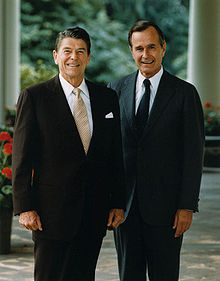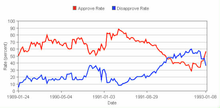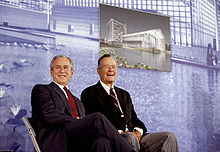- George H. W. Bush
-
This article is about the 41st U.S. president. For ship named after him, see USS George H.W. Bush (CVN-77). For his son, the 43rd U.S. president, see George W. Bush. For other persons of the same name, see George Bush (disambiguation).
George H. W. Bush 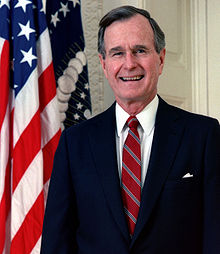
41st President of the United States In office
January 20, 1989 – January 20, 1993Vice President Dan Quayle Preceded by Ronald Reagan Succeeded by Bill Clinton 43rd Vice President of the United States In office
January 20, 1981 – January 20, 1989President Ronald Reagan Preceded by Walter Mondale Succeeded by Dan Quayle 11th Director of Central Intelligence In office
January 30, 1976 – January 20, 1977President Gerald Ford Preceded by William Colby Succeeded by Stansfield Turner Chief of the Liaison Office to the People's Republic of China In office
September 26, 1974 – December 7, 1975President Gerald Ford Preceded by David Bruce Succeeded by Thomas Gates 48th Chairperson of the Republican National Committee In office
1973–1974Preceded by Bob Dole Succeeded by Mary Smith United States Ambassador to the United Nations In office
1971–1973President Richard Nixon Preceded by Charles Yost Succeeded by John Scali Member of the U.S. House of Representatives
from Texas's 7th districtIn office
January 3, 1967 – January 3, 1971Preceded by John Dowdy Succeeded by William Archer Personal details Born George Herbert Walker Bush
June 12, 1924
Milton, MassachusettsPolitical party Republican Spouse(s) Barbara Pierce (1945–present) Children George
Pauline
Jeb
Neil
Marvin
DorothyAlma mater Yale University Profession Entrepreneur (Oil) Religion Episcopal Signature 
Website Presidential Library and Museum Military service Service/branch United States Navy Years of service 1942–1945 Rank  Lieutenant (junior grade)
Lieutenant (junior grade)Unit Fast Carrier Task Force Battles/wars World War II Awards Distinguished Flying Cross
Air Medal (3)
Presidential Unit CitationGeorge Herbert Walker Bush (born June 12, 1924) is an American politician who served as the 41st President of the United States (1989–93). He had previously served as the 43rd Vice President of the United States (1981–89), a congressman, an ambassador, and Director of Central Intelligence.
Bush was born in Milton, Massachusetts, to Senator Prescott Bush and Dorothy Walker Bush. Following the attacks on Pearl Harbor in 1941, at the age of 18, Bush postponed going to college and became the youngest aviator in the US Navy at the time.[1] He served until the end of the war, then attended Yale University. Graduating in 1948, he moved his family to West Texas and entered the oil business, becoming a millionaire by the age of 40.
He became involved in politics soon after founding his own oil company, serving as a member of the House of Representatives, among other positions. He ran unsuccessfully for president of the United States in 1980, but was chosen by party nominee Ronald Reagan to be the vice presidential nominee, and the two were subsequently elected. During his tenure, Bush headed administration task forces on deregulation and fighting drug abuse.
In 1988, Bush launched a successful campaign to succeed Reagan as president, defeating Democratic opponent Michael Dukakis. Foreign policy drove the Bush presidency; military operations were conducted in Panama and the Persian Gulf at a time of world change; the Berlin Wall fell in 1989 and the Soviet Union dissolved two years later. Domestically, Bush reneged on a 1988 campaign promise and after a struggle with Congress, signed an increase in taxes that Congress had passed. In the wake of economic concerns, he lost the 1992 presidential election to Democrat Bill Clinton.
Bush is the father of George W. Bush, the 43rd President of the United States, and Jeb Bush, former Governor of Florida. He is the most recent president to have been a World War II veteran, and will arguably be the last to do so. Until the election of his son George W. Bush to the presidency in 2000, Bush was commonly referred to simply as "George Bush"; since that time, the forms "George H. W. Bush", "Bush 41", "Bush the Elder", and "George Bush, Sr." have come into common use as a way to distinguish the father from the son.
Contents
Early years
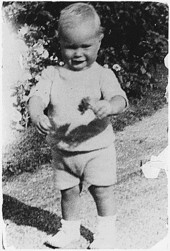 Young George H. W. Bush taking his first steps at his grandfather's house in Kennebunkport, Maine, circa 1925
Young George H. W. Bush taking his first steps at his grandfather's house in Kennebunkport, Maine, circa 1925
George Herbert Walker Bush was born at 173 Adams Street in Milton, Massachusetts[2] on June 12, 1924 to Prescott Sheldon Bush and Dorothy Walker Bush. The Bush family moved from Milton to Greenwich, Connecticut shortly after his birth.
Bush began his formal education at the Greenwich Country Day School in Greenwich. Beginning in 1936, he attended Phillips Academy in Andover, Massachusetts, where he held a large number of leadership positions including being the president of the senior class and secretary of the student council, president of the community fund-raising group, a member of the editorial board of the school newspaper, and captain of both the varsity baseball and soccer teams.[3]
World War II
Following the attack on Pearl Harbor in December 1941, Bush decided to join the US Navy,[1] so after graduating from Phillips Academy earlier in 1942,[3] he became a naval aviator at the age of 18. After completing the 10-month course, he was commissioned as an ensign in the U.S. Naval Reserve at Corpus Christi, Texas on June 9, 1943, just three days before his 19th birthday, which made him the youngest naval aviator to that date.[1]
He was assigned to Torpedo Squadron (VT-51) as the photographic officer in September 1943.[1] The following year, his squadron was based on the USS San Jacinto as a member of Air Group 51, where his lanky physique earned him the nickname 'Skin'.[4] During this time, the task force was victorious in one of the largest air battles of World War II: the Battle of the Philippine Sea.[1]
After Bush's promotion to Lieutenant (junior grade) on August 1, the San Jacinto commenced operations against the Japanese in the Bonin Islands. Bush piloted one of four Grumman TBM Avenger aircraft from VT-51 that attacked the Japanese installations on Chichijima.[5] His crew for the mission, which occurred on September 2, 1944, included Radioman Second Class John Delaney and Lieutenant Junior Grade William White.[1] During their attack, the Avengers encountered intense anti-aircraft fire; Bush's aircraft was hit by flak[6] and his engine caught on fire.[1] Despite his plane being on fire, Bush completed his attack and released bombs over his target, scoring several damaging hits.[1] With his engine afire, Bush flew several miles from the island, where he and one other crew member on the TBM Avenger bailed out of the aircraft;[6] the other man's parachute did not open.[1] It has not been determined which man bailed out with Bush[1] as both Delaney and White were killed as a result of the battle.[6] Bush waited for four hours in an inflated raft, while several fighters circled protectively overhead until he was rescued by the lifeguard submarine USS Finback.[1] For the next month he remained on the Finback, and participated in the rescue of other pilots.
 George Bush in his TBM Avenger on the carrier USS San Jacinto in 1944
George Bush in his TBM Avenger on the carrier USS San Jacinto in 1944
Bush subsequently returned to San Jacinto in November 1944 and participated in operations in the Philippines[1] until his squadron was replaced and sent home to the United States. Through 1944, he flew 58 combat missions[6] for which he received the Distinguished Flying Cross, three Air Medals, and the Presidential Unit Citation awarded to San Jacinto.[1]
Because of his valuable combat experience, Bush was reassigned to Norfolk Navy Base and put in a training wing for new torpedo pilots. He was later assigned as a naval aviator in a new torpedo squadron, VT-153, based at Naval Air Station Grosse Ile, Michigan. Upon the Japanese surrender in 1945, Bush was honorably discharged in September of that year.
Marriage and college years
George Bush married Barbara Pierce on January 6, 1945, only weeks after his return from the Pacific. The couple's first residence was a small rented apartment in Trenton, Michigan, near Bush's Navy assignment at NAS Grosse Ile. Their marriage produced six children: George Walker Bush (born 1946), Pauline Robinson Bush ("Robin", 1949–1953, died of leukemia), John Ellis "Jeb" Bush (born 1953), Neil Mallon Bush (born 1955), Marvin Pierce Bush (born 1956), and Dorothy Bush Koch (born 1959).[7]
Bush had been accepted to Yale University prior to his enlistment in the military,[8] and took up the offer after his discharge and marriage. While at Yale, he was enrolled in an accelerated program that allowed him to graduate in two and a half years, rather than four.[8] He was a member of the Delta Kappa Epsilon fraternity and was elected president. He also captained the Yale baseball team, and as a left-handed first baseman, played in the first two College World Series.[8] As the team captain, Bush met Babe Ruth before a game during his senior year. Late in his junior year he was, like his father Prescott Bush (1917), initiated into the Skull and Bones secret society. He graduated as a member of the Phi Beta Kappa from Yale in 1948 with a Bachelor of Arts degree in economics.[9]
 George H. W. Bush meeting baseball icon Babe Ruth at Yale, 1946.
George H. W. Bush meeting baseball icon Babe Ruth at Yale, 1946.
Business career
After graduating from Yale, Bush moved his family to West Texas. His father's business connections proved useful when he ventured into the oil business, starting as a sales clerk[10] with Dresser Industries,[11] a subsidiary of Brown Brothers Harriman. His father had served on the board of directors there for 22 years. Bush started the Bush-Overby Oil Development company in 1951[12] and co-founded the Zapata Petroleum Corporation, an oil company which drilled in the Permian Basin in Texas, two years later. He was named president of the Zapata Offshore Company, a subsidiary which specialized in offshore drilling, in 1954.[10] The subsidiary became independent in 1958, so Bush moved the company from Midland, Texas to Houston.[11] He continued serving as president of the company until 1964, and later chairman until 1966, but his ambitions turned political.[11] By that time, Bush had become a millionaire.[10]
Political career (1964–1980)
Congressional years
Bush served as Chairman of the Republican Party for Harris County, Texas in 1964, but wanted to be more involved in policy making, so he set his stakes high: he aimed for a US Senate seat from Texas.[11] After winning the Republican primary, Bush faced his opponent, incumbent Democrat Ralph W. Yarborough. Yarborough attacked Bush as a right-wing extremist, and Bush lost the general election. Bush's ticket mate, Jack Crichton of Dallas, lost by a much wider margin in the same election to Governor John B. Connally, Jr. Bush and Crichton had shared some of the same podiums in the campaign.[13]
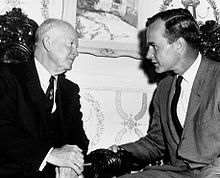 Bush with President Dwight D. Eisenhower
Bush with President Dwight D. Eisenhower
Bush was elected in 1966 to a House of Representatives seat from the 7th District of Texas, defeating Democrat Frank Briscoe with 57% of the vote;[14] he became the first Republican to represent Houston.[11] His voting record in the House was generally conservative:[11] Bush opposed the public accommodations contention in the 1964 Civil Rights Act, and supported open-housing legislation, something generally unpopular in his district.[11] He supported the Nixon administration's Vietnam policies, but broke with Republicans on the issue of birth control.[11] Despite being a first-term congressman, Bush was appointed to the powerful House Ways and Means Committee,[10] where he voted to abolish the military draft.[10] He was elected to a second term in 1968.[15]
In 1970, Nixon convinced Bush to relinquish his House seat to again run for the Senate against Ralph Yarborough, a fierce Nixon critic. In the Republican primary, Bush easily defeated conservative Robert J. Morris, by a margin of 87.6 percent to 12.4 percent.[16] However, former Congressman Lloyd Bentsen, a more moderate Democrat and native of Mission in south Texas, defeated Yarborough in the Democratic primary.[10] Yarborough then endorsed Bentsen, who defeated Bush, 53.4 to 46.6 percent.[17] Nixon came to Texas to campaign in Longview for Bush and his gubernatorial ticket-mate, Paul Eggers, a Dallas lawyer who was a close friend of U.S. Senator John G. Tower.[18]
Ambassador to the United Nations
Following his 1970 loss, Bush was well known as a prominent Republican businessman from the "Sun Belt", a group of states in the Southern part of the country.[10] Nixon noticed and appreciated the sacrifice Bush had made of his Congressional position,[11] so he appointed him Ambassador to the United Nations.[9] He was confirmed unanimously by the Senate, and served for two years, beginning in 1971.[11]
Chairman of the Republican National Committee
Amidst the Watergate scandal, Nixon asked Bush to become chairman of the Republican National Committee in 1973.[9] Bush accepted, and held this position when the popularity of both Nixon and the Republican Party plummeted.[19] He defended Nixon steadfastly, but later as Nixon's complicity became clear, Bush focused more on defending the Republican Party, while still maintaining loyalty to Nixon.[11] As chairman, Bush formally requested that Nixon eventually resign for the good of the Republican party.[11] Nixon did this on August 9, 1974; Bush noted in his diary that "There was an aura of sadness, like somebody died... The [resignation] speech was vintage Nixon—a kick or two at the press—enormous strains. One couldn't help but look at the family and the whole thing and think of his accomplishments and then think of the shame... [Ford's swearing-in offered] indeed a new spirit, a new lift."[20]
Envoy to China
Gerald Ford, Nixon's successor, appointed Bush to be Chief of the US Liaison Office in the People's Republic of China. Since the United States at the time maintained official relations with the Republic of China on Taiwan and not the People's Republic of China, the Liaison Office did not have the official status of an embassy and Bush did not formally hold the position of "ambassador", though he unofficially acted as one. The time that he spent in China – 14 months – was seen as largely beneficial for US-Chinese relations.[11]
After Ford's accession to the presidency, Bush was under serious consideration for being nominated as Vice President. Ford eventually narrowed his list to Nelson Rockefeller and Bush. However, White House Chief of Staff Donald Rumsfeld reportedly preferred Rockefeller over Bush.[21] Rockefeller was finally named and confirmed.
Director of Central Intelligence
In 1976, Ford brought Bush back to Washington to become Director of Central Intelligence, replacing William Colby.[22] He served in this role for 357 days, from January 30, 1976 to January 20, 1977.[23] The CIA had been rocked by a series of revelations, including those based on investigations by the Church Committee regarding illegal and unauthorized activities by the CIA, and Bush was credited with helping to restore the agency's morale.[24] In his capacity as DCI, Bush gave national security briefings to Jimmy Carter both as a Presidential candidate and as President-elect, and discussed the possibility of remaining in that position in a Carter administration[25] but it was not to be.
Other positions
After a Democratic administration took power in 1977, Bush became chairman on the Executive Committee of the First International Bank in Houston.[26] He later spent a year as a part-time professor of Administrative Science at Rice University's Jones School of Business beginning in 1978, the year it opened;[27] Bush said of his time there, "I loved my brief time in the world of academia."[27] Between 1977 and 1979, he was a director of the Council on Foreign Relations foreign policy organization.[28]
1980 presidential campaign
Bush had decided in the late 1970s that he was going to run for president in 1980;[21] in 1979, he attended 850 political events and traveled more than 250,000 miles (400,000 km) to campaign for the nation's highest office.[21] In the contest for the Republican Party nomination, Bush stressed his wide range of government experience, while competing against rivals Senator Howard Baker of Tennessee, Senator Bob Dole of Kansas, Congressman John Anderson of Illinois (who would later run as an independent), Congressman Phil Crane, also of Illinois, former Governor John Connally of Texas, and the front-runner Ronald Reagan, former actor and Governor of California.[21]
In the primary election, Bush focused almost entirely on the Iowa caucuses, while Reagan ran a more traditional campaign.[21] Bush represented the centrist wing in the GOP, whereas Reagan represented conservatives. Bush famously labeled Reagan's supply side-influenced plans for massive tax cuts "voodoo economics". His strategy proved useful, to some degree, as he won in Iowa with 31.5 percent to Reagan's 29.4 percent.[21] After the win, Bush stated that his campaign was full of momentum, or "Big Mo".[21] As a result of the loss, Reagan replaced his campaign manager, reorganized his staff, and concentrated on the New Hampshire primary. The two men agreed to a debate in the state, organized by the Nashua Telegraph, but paid for by the Reagan campaign. Reagan invited the other four candidates as well, but Bush refused to debate them, and eventually they left.[21] The debate proved to be a pivotal moment in the campaign; when the moderator, John Breene, ordered Reagan's microphone turned off, his angry response, "I am paying for this microphone Mr. Greene", [sic] struck a chord with the public.[21] Bush ended up losing New Hampshire's primary with 23 percent to Reagan's 50 percent.[21] Bush lost most of the remaining primaries as well, and formally dropped out of the race in May of that year.[21]
With his political future seeming dismal, Bush sold his house in Houston and bought his grandfather's estate in Kennebunkport, Maine, known as "Walker's Point".[29] At the Republican Convention, however, Reagan selected Bush as his Vice Presidential nominee, placing him on the winning Republican presidential ticket of 1980.
Vice Presidency (1981–1989)
See also: Presidency of Ronald ReaganFirst Term (1981–1985)
As Vice President, Bush generally took on a low profile while recognizing the constitutional limits of the office; he avoided decision-making or criticizing Reagan in any way.[21] As had become customary, he and his wife moved into the Vice President's residence at Number One Observatory Circle, about two miles from the White House. The Bushes attended a large number of public and ceremonial events in their positions, including many state funerals, which became a common joke for comedians.[21] Mrs. Bush found the funerals largely beneficial, saying, "George met with many current or future heads of state at the funerals he attended, enabling him to forge personal relationships that were important to President Reagan."[21] As the President of the Senate, Bush stayed in contact with members of Congress, and kept the president informed on occurrences on Capitol Hill.[21]
On March 30, 1981, early into the administration, Reagan was shot and seriously wounded in Washington, D.C. Bush, second in command by the presidential line of succession, was in Dallas, Texas, and flew back to Washington immediately. Reagan's cabinet convened in the White House Situation Room, where they discussed various issues, including the availability of the Nuclear Football. When Bush's plane landed, his aides advised him to proceed directly to the White House by helicopter, as an image of the government still functioning despite the attack.[21] Bush rejected the idea, responding, "Only the President lands on the South Lawn".[21] This made a positive impression on Reagan,[21] who recovered and returned to work within two weeks. From then on, the two men would have regular Thursday lunches in the Oval Office.[21]
In December 1983 Bush flew to El Salvador and warned that country's military leaders to end their death squads and hold fully free elections or face the loss of U.S. aid. Bush's aides feared for his safety and thought about calling the meeting off when they discovered apparent blood stains on the floor of the presidential palace of Álvaro Magaña. Bush was never told of the aides' concerns and a tense meeting was held in which some of Magaña's personnel brandished semiautomatic weapons and refused requests to take them outside.[30]
Bush was assigned by Reagan to chair two special task forces, on deregulation and international drug smuggling. The deregulation task force reviewed hundreds of rules, making specific recommendations on which ones to amend or revise, in order to curb the size of the federal government. The drug smuggling task force coordinated federal efforts to reduce the quantity of drugs entering the US. Both were popular issues with conservatives, and Bush, largely a moderate, began courting them through his work.[21]
Second Term (1985–1989)
Reagan and Bush ran for reelection in 1984. The Democratic opponent, Walter Mondale, made history by choosing a woman as his running mate, New York Representative Geraldine Ferraro. She and Bush squared off in a single televised Vice Presidential debate.[31] Serving as a contrast to the Ivy-League educated Bush, Ferraro represented a "blue-collar" district in Queens, New York; this, coupled with her popularity among female journalists, left Bush at a disadvantage.[21] However, the Reagan-Bush ticket won in a landslide against the Mondale-Ferraro ticket. Early into his second term as Vice President, Bush and his aides were planning a run for the presidency in 1988. By the end of 1985, a committee had been established and over two million dollars raised for Bush.[21]
Bush became the first Vice President to become Acting President when, on July 13, 1985, Reagan underwent surgery to remove polyps from his colon making Bush Acting President for approximately eight hours.
The Reagan administration was shaken by a scandal in 1986, when it was revealed that administration officials had secretly arranged weapon sales to Iran, and had used the proceeds to fund the anticommunist Contras in Nicaragua, a direct violation of the law.[21] When the Iran-Contra Affair, as it became known, broke to the media, Bush, like Reagan, stated that he had been "out of the loop" and unaware of the diversion of funds,[32] although this was later questioned.[33] But his own diaries from that time stated "I'm one of the few people that know fully the details ..." He had repeatedly refused to disclose this to investigators.[34] Public opinion polls taken at the time indicated that the public questioned Bush's explanation of being an "innocent bystander" while the trades were occurring; this led to the notion that he was a "wimp".[21] However, his fury during an interview with CBS's Dan Rather largely put the "wimp" issue to rest.[21]
As Vice President, Bush officially opened the 1987 Pan American Games in Indianapolis.
1988 presidential campaign
Main article: United States presidential election, 1988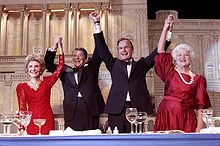 President Ronald Reagan endorses Bush in May 1988 at the President's dinner in Washington, DC; First Lady Nancy Reagan is at left and Barbara Bush on the right.
President Ronald Reagan endorses Bush in May 1988 at the President's dinner in Washington, DC; First Lady Nancy Reagan is at left and Barbara Bush on the right.
 Bush in Nashua, New Hampshire in 1987
Bush in Nashua, New Hampshire in 1987
Bush had been planning a presidential run since as early as 1985,[21] and entered the Republican primary for President of the United States in October 1987. His challengers for the Republican presidential nomination included US Senator Bob Dole of Kansas, US Representative Jack Kemp of New York, former Governor Pete DuPont of Delaware, and conservative Christian televangelist Pat Robertson.
Though considered the early frontrunner for the nomination, Bush came in third in the Iowa caucus, behind winner Dole and runner-up Robertson.[35] Much like Reagan did in 1980, Bush reorganized his staff and concentrated on the New Hampshire primary.[21] With Dole ahead in New Hampshire, Bush ran television commercials portraying the senator as a tax raiser;[36] he rebounded to win the state's primary. Bush continued seeing victory, winning many Southern primaries as well.[11] Once the multiple-state primaries such as Super Tuesday began, Bush's organizational strength and fundraising lead were impossible for the other candidates to match, and the nomination was his.[10]
Leading up to the 1988 Republican National Convention, there was much speculation as to Bush's choice of running mate. Bush chose little-known US Senator Dan Quayle of Indiana, favored by conservatives.[10] Despite Reagan's popularity, Bush trailed Democratic nominee Michael Dukakis, then Governor of Massachusetts, in most polls.[37]
Bush, occasionally criticized for his lack of eloquence when compared to Reagan,[21] delivered a well-received speech at the 1988 Republican National Convention.[37] Known as the "thousand points of light" speech, this described Bush's vision of America: he endorsed the Pledge of Allegiance, prayer in schools, capital punishment, gun rights, and his opposition to abortion.[37] The speech at the convention included Bush's famous pledge: "Read my lips: no new taxes".[38]
The general election campaign between the two men has been described as one of the nastiest in modern times.[38] Bush blamed Dukakis for polluting the Boston Harbor as the Massachusetts governor.[11] Bush also pointed out that Dukakis was opposed to the law that would require all students to say the Pledge of Allegiance,[10] a topic well covered in Bush's nomination acceptance speech.[37]
Dukakis's unconditional opposition to capital punishment led to a pointed question during the presidential debates. Moderator Bernard Shaw asked Dukakis hypothetically if Dukakis would support the death penalty if his wife, Kitty, were raped and murdered.[39] Dukakis's response of no, as well as the Willie Horton ad, contributed toward Bush's characterization of him as "soft on crime".[11]
Bush defeated Dukakis and his running mate, Lloyd Bentsen, in the Electoral College, by 426 to 111 (Bentsen received one vote from a faithless elector).[38] In the nationwide popular vote, Bush took 53.4 percent of the ballots cast[11] while Dukakis received 45.6 percent. Bush became the first serving Vice President to be elected President since Martin Van Buren in 1836[21] as well as the first person to succeed someone from his own party to the Presidency via election to the office in his own right since Herbert Hoover in 1929.
Presidency (1989–1993)
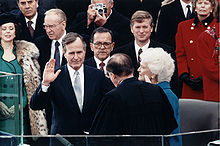 Chief Justice William Rehnquist administering the oath of office to Bush during Inaugural ceremonies at the United States Capitol, January 20, 1989.
Chief Justice William Rehnquist administering the oath of office to Bush during Inaugural ceremonies at the United States Capitol, January 20, 1989.
Bush was inaugurated on January 20, 1989, succeeding Ronald Reagan. He entered office at a period of change in the world; the fall of the Berlin Wall and the collapse of Soviet Union came early in his presidency.[40] He ordered military operations in Panama and the Persian Gulf[40] and, at one point, was recorded as having a record-high approval rating of 89 percent.[41] However, economic recession and breaking his "no new taxes" pledge caused a sharp decline in his approval rating, and Bush was defeated in the 1992 election.[40]
In his Inaugural Address, Bush said:
“ I come before you and assume the Presidency at a moment rich with promise. We live in a peaceful, prosperous time, but we can make it better. For a new breeze is blowing, and a world refreshed by freedom seems reborn; for in man's heart, if not in fact, the day of the dictator is over. The totalitarian era is passing, its old ideas blown away like leaves from an ancient, lifeless tree. A new breeze is blowing, and a nation refreshed by freedom stands ready to push on. There is new ground to be broken, and new action to be taken.[42] ” Domestic policy
Economy
Early in his term, Bush faced the problem of what to do with leftover deficits spawned by the Reagan years. At $220 billion in 1990, the deficit had grown to three times its size since 1980.[10] Bush was dedicated to curbing the deficit, believing that America could not continue to be a leader in the world without doing so.[10] He began an effort to persuade the Democratic controlled Congress to act on the budget;[10] with Republicans believing that the best way was to cut government spending, and Democrats convinced that the only way would be to raise taxes, Bush faced problems when it came to consensus building.[10]
In the wake of a struggle with Congress, Bush was forced by the Democratic majority to raise tax revenues; as a result, many Republicans felt betrayed because Bush had promised "no new taxes" in his 1988 campaign.[10] Perceiving a means of revenge, Republican congressmen defeated Bush's proposal which would enact spending cuts and tax increases that would reduce the deficit by $500 billion over five years.[10] Scrambling, Bush accepted the Democrats' demands for higher taxes and more spending, which alienated him from Republicans and gave way to a sharp decrease in popularity.[11] Bush would later say that he wished he had never signed the bill.[10] Near the end of the 101st Congress, the president and congressional members reached a compromise on a budget package that increased the marginal tax rate and phased out exemptions for high-income taxpayers.[11] Despite demands for a reduction in the capital gains tax, Bush relented on this issue as well.[11] This agreement with the Democratic leadership in Congress proved to be a turning point in the Bush presidency; his popularity among Republicans never fully recovered.[11]
Coming at around the same time as the budget deal, America entered into a mild recession, lasting for six months.[10] Many government programs, such as welfare, increased.[10] As the unemployment rate edged upward in 1991, Bush signed a bill providing additional benefits for unemployed workers.[11] 1991 was marked by many corporate reorganizations, which laid off a substantial number of workers. Many now unemployed were Republicans and independents, who had believed that their jobs were secure.
By his second year in office, Bush was told by his economic advisors to stop dealing with the economy, as they believed that he had done everything necessary to ensure his reelection.[10] By 1992, interest and inflation rates were the lowest in years, but by midyear the unemployment rate reached 7.8 percent, the highest since 1984.[11] In September 1992, the Census Bureau reported that 14.2 percent of all Americans lived in poverty.[11] At a press conference in 1990, Bush told reporters that he found foreign policy more enjoyable.[10]
Major initiatives
See also: Environmental policy of the United States#The George H. W. Bush Administration (1988–1992)During a speech to commemorate the 20th anniversary of the Apollo 11 moon landing, Bush announced a vision to complete Space Station Freedom, resume exploration of the Moon and begin exploration of Mars.[43] Although a space station was eventually constructed–work on the International Space Station began in 1998–other work has been confounded by NASA budgetary issues. In 1998, Bush received the Rotary National Award for Space Achievement's National Space Trophy for his pioneering leadership of our nation's space program.
Bush signed a number of major laws in his presidency, including the Americans with Disabilities Act of 1990; this was one of the most pro-civil rights bills in decades.[10] He worked to increase federal spending for education, childcare, and advanced technology research.[10] In dealing with the environment, Bush reauthorized the Clean Air Act, requiring cleaner burning fuels.[10] He quarreled with Congress over an eventually signed bill to aid police in capturing criminals, and signed into law a measure to improve the nation's highway system.[10] Bush signed the Immigration Act of 1990,[44] which increased legal immigration to the United States by 40 percent.[45]
Bush was a Life Member of the National Rifle Association and had campaigned as a "Pro-gun" candidate with the NRA's endorsement in 1988. However, in March 1989 he placed a temporary ban on the import of certain semiautomatic rifles.[46] This action cost him endorsement from the NRA in 1992. Bush publicly resigned his life membership in the organization after losing the election and receiving a form letter from NRA depicting agents of the Bureau of Alcohol Tobacco and Firearms as "jack-booted thugs". He called the NRA letter a " vicious slander on good people."[47]
Judicial appointments
Supreme Court
Main article: George H. W. Bush Supreme Court candidatesBush appointed the following Justices to the Supreme Court of the United States:
- David Souter – 1990
- Clarence Thomas – 1991
Other courts
Main article: George H. W. Bush judicial appointmentsIn addition to his two Supreme Court appointments, Bush appointed 42 judges to the United States Courts of Appeals, and 148 judges to the United States district courts. Among these appointments was Vaughn R. Walker, who would later be revealed to be the earliest known gay federal judge.[48] Bush also experienced a number of judicial appointment controversies, as 11 nominees for 10 federal appellate judgeships were not processed by the Democratic-controlled Senate Judiciary Committee.[49]
Foreign policy
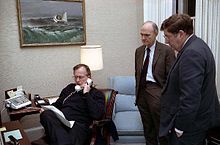 Bush speaks on the telephone regarding Operation Just Cause with General Brent Scowcroft and Chief of Staff John H. Sununu, 1989
Bush speaks on the telephone regarding Operation Just Cause with General Brent Scowcroft and Chief of Staff John H. Sununu, 1989
Panama
Main article: United States invasion of PanamaIn the 1980s, Panamanian leader Manuel Noriega, a once US-supportive leader who was later accused of spying for Fidel Castro and using Panama to traffic drugs into the US, was one of the most recognizable names in the United States, being constantly covered by the press. The struggle to remove him from power began in the Reagan administration,[50] when economic sanctions were imposed on the country;[51] this included prohibiting US companies and government from making payments to Panama and freezing $56 million in Panamanian funds in US banks.[51] Reagan sent more than 2,000 US troops to Panama as well.[51] Unlike Reagan, Bush was able to remove Noriega from power, but his administration's unsuccessful post-invasion planning hindered the needs of Panama during the establishment of the young democratic government.[50]
In May 1989, Panama held democratic elections, in which Guillermo Endara was elected president; the results were then annulled by Noriega's government.[52] In response, Bush sent 2,000 more troops to the country, where they began conducting regular military exercises in Panamanian territory (in violation of prior treaties).[51] Bush then removed an embassy and ambassador from the country, and dispatched additional troops to Panama to prepare the way for an upcoming invasion.[51] Noriega suppressed an October military coup attempt and massive protests in Panama against him, but after a US serviceman was shot by Panamanian forces in December 1989, Bush ordered 24,000 troops into the country with an objective of removing Noriega from power;[52] "Operation Just Cause" was a large-scale American military operation, and the first in more than 40 years that was not Cold War related.[50]
The mission was controversial,[53] but American forces achieved control of the country and Endara assumed the Presidency. Noriega surrendered to the US and was convicted and imprisoned on racketeering and drug trafficking charges in April 1992.[54] President Bush and First Lady Barbara Bush visited Panama in June 1992, to give support to the first post-invasion Panamanian government.
Soviet Union
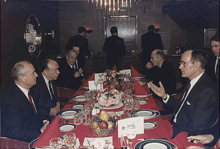 Bush and Gorbachev meet at a summit in Malta
Bush and Gorbachev meet at a summit in Malta See also: Dissolution of the Soviet Union, New world order (politics), A World Transformed, and History of the United States (1988–present)#The end of the Cold War
See also: Dissolution of the Soviet Union, New world order (politics), A World Transformed, and History of the United States (1988–present)#The end of the Cold WarIn 1989, just after the fall of the Berlin Wall, Bush met with Soviet General Secretary Mikhail Gorbachev in a conference on the Mediterranean island of Malta. The administration had been under intense pressure to meet with the Soviets,[55] but not all initially found the Malta summit to be a step in the right direction; General Brent Scowcroft, among others, was apprehensive about the meeting, saying that it might be "premature" due to concerns where, according to Dr. Condoleezza Rice, "expectations [would be] set that something was going to happen, where the Soviets might grandstand and force [the US] into agreements that would ultimately not be good for the United States".[55] But European leaders, including François Mitterrand and Margaret Thatcher, encouraged Bush to meet with Gorbachev,[55] something that he did December 2 and 3, 1989.[56] Though no agreements were signed, the meeting was viewed largely as being an important one; when asked about nuclear war, Gorbachev responded, "I assured the President of the United States that the Soviet Union would never start a hot war against the United States of America. And we would like our relations to develop in such a way that they would open greater possibilities for cooperation.... This is just the beginning. We are just at the very beginning of our road, long road to a long-lasting, peaceful period".[57] The meeting was received as a very important step to the end of the Cold War.[58]
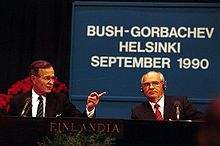 Bush and Mikhail Gorbachev in Helsinki summit in 1990
Bush and Mikhail Gorbachev in Helsinki summit in 1990
Another summit was held in July 1991, where the Strategic Arms Reduction Treaty (START I) was signed by Bush and Gorbachev in Moscow.[59] The treaty took nine years in the making and was the first major arms agreement since the signing of the Intermediate Ranged Nuclear Forces Treaty by Reagan and Gorbachev in 1987. The contentions in START would reduce the US's and USSR's strategic nuclear weapons by about 35% over seven years, and the Soviet Union's land-based intercontinental ballistic missiles would be cut by 50%.[59] Bush described START as "a significant step forward in dispelling half a century of mistrust".[59] After the dissolution of the USSR in 1991, President Bush and Gorbachev declared a US-Russian strategic partnership, marking the end of the Cold War.
Gulf War
Main article: Gulf War President Bush visited American troops in Saudi Arabia on Thanksgiving Day, 1990
President Bush visited American troops in Saudi Arabia on Thanksgiving Day, 1990
On August 1, 1990, Iraq, led by Saddam Hussein, invaded its oil-rich neighbor to the south, Kuwait; Bush condemned the invasion[60] and began rallying opposition to Iraq in the US and among European, Asian, and Middle Eastern allies.[10] Secretary of Defense Richard Bruce "Dick" Cheney traveled to Saudi Arabia to meet with King Fahd; Fahd requested US military aid in the matter, fearing a possible invasion of his country as well.[60] The request was met initially with Air Force fighter jets. Iraq made attempts to negotiate a deal that would allow the country to take control of half of Kuwait. Bush rejected this proposal and insisted on a complete withdrawal of Iraqi forces.[10] The planning of a ground operation by US-led coalition forces began forming in September 1990, headed by General Norman Schwarzkopf.[60] Bush spoke before a joint session of the US Congress regarding the authorization of air and land attacks, laying out four immediate objectives: "Iraq must withdraw from Kuwait completely, immediately, and without condition. Kuwait's legitimate government must be restored. The security and stability of the Persian Gulf must be assured. And American citizens abroad must be protected." He then outlined a fifth, long-term objective: "Out of these troubled times, our fifth objective – a new world order – can emerge: a new era – freer from the threat of terror, stronger in the pursuit of justice, and more secure in the quest for peace. An era in which the nations of the world, East and West, North and South, can prosper and live in harmony.... A world where the rule of law supplants the rule of the jungle. A world in which nations recognize the shared responsibility for freedom and justice. A world where the strong respect the rights of the weak."[61] With the United Nations Security Council opposed to Iraq's violence, Congress authorized the Use of Military force[60] with a set goal of returning control of Kuwait to the Kuwaiti government, and protecting America's interests abroad.[10]
Early on the morning of January 17, 1991, allied forces launched the first attack, which included more than 4,000 bombing runs by coalition aircraft.[10] This pace would continue for the next four weeks, until a ground invasion was launched on February 24. Allied forces penetrated Iraqi lines and pushed toward Kuwait City while on the west side of the country, forces were intercepting the retreating Iraqi army.[10] Bush made the decision to stop the offensive after a mere 100 hours. Critics labeled this decision premature, as hundreds of Iraqi forces were able to escape; Bush responded by saying that he wanted to minimize US casualties.[10] Opponents further charged that Bush should have continued the attack, pushing Hussein's army back to Baghdad, then removing him from power.[10] Bush explained that he did not give the order to overthrow the Iraqi government because it would have "incurred incalculable human and political costs.... We would have been forced to occupy Baghdad and, in effect, rule Iraq."[62]
Bush's approval ratings skyrocketed after the successful offensive.[10] Additionally, President Bush and Secretary of State Baker felt the coalition victory had increased U.S. prestige abroad and believed there was a window of opportunity to use the political capital generated by the coalition victory to revitalize the Arab-Israeli peace process. The administration immediately returned to Arab-Israeli peacemaking following the end of the Gulf War; this resulted in the Madrid Conference, later in 1991.[63]
Somali Civil War
Main article: Somali Civil WarFaced with a humanitarian disaster in Somalia, exacerbated by a complete breakdown in civil order, the United Nations had created the UNOSOM I mission in April 1992. However, the complete intransigence of the local warlords operating in Somalia and their rivalries with each other meant that UNOSOM I could not be performed. The mission never reached its mandated strength.[64] Resolution 794 was unanimously adopted by the United Nations Security Council on December 3, 1992, and they welcomed the United States offer to help create a secure environment for humanitarian efforts in Somalia.[65] President George H. W. Bush responded to this by initiating Operation Restore Hope on December 4, 1992, under which the United States would assume command in accordance with Resolution 794.[66] The vast bulk of UNITAF's total personnel strength was provided by the United States (Some 25,000 out of a total of 37,000 personnel). The first elements of UNITAF landed on the beaches of Somalia on December 9, 1992 amid a media circus. However, Mohamed Farrah Aidid saw UNOSOM II as a threat to his power and in June 1993 his militia attacked Pakistan Army troops, attached to UNOSOM II, (see Somalia (March 1992 to February 1996)) in Mogadishu inflicting over 80 casualties. Fighting escalated until 19 American troops and more than 1,000 civilians and militia were killed in a raid in Mogadishu during October 1993.[67]
NAFTA
Main article: North American Free Trade Agreement From left to right: (standing) President Carlos Salinas, President Bush, Prime Minister Brian Mulroney; (seated) Jaime Serra Puche, Carla Hills, and Michael Wilson at the NAFTA Initialing Ceremony, October 1992
From left to right: (standing) President Carlos Salinas, President Bush, Prime Minister Brian Mulroney; (seated) Jaime Serra Puche, Carla Hills, and Michael Wilson at the NAFTA Initialing Ceremony, October 1992
Bush's administration, along with the Progressive Conservative Canadian Prime Minister Brian Mulroney, spearheaded the negotiations of the North American Free Trade Agreement (NAFTA), which would eliminate the majority of tariffs on products traded among the United States, Canada, and Mexico, to encourage trade amongst the countries.[68] The treaty also restricts patents, copyrights, and trademarks, and outlines the removal of investment restrictions among the three countries.[68]
The agreement came under heavy scrutiny amongst mainly Democrats, who charged that NAFTA resulted in a loss of US jobs.[10] NAFTA also contained no provisions for labor rights;[69] according to the Bush administration, the trade agreement would generate economic resources necessary to enable Mexico's government to overcome problems of funding and enforcement of its labor laws.[69] Bush needed a renewal of negotiating authority to move forward with the NAFTA trade talks. Such authority would enable the president to negotiate a trade accord that would be submitted to Congress for a vote, thereby avoiding a situation in which the president would be required to renegotiate with trading partners those parts of an agreement that Congress wished to change.[69] While initial signing was possible during his term, negotiations made slow, but steady, progress. President Clinton would go on to make the passage of NAFTA a priority for his administration, despite its conservative and Republican roots – with the addition of two side agreements – to achieve its passage in 1993.[70]
The treaty has since been defended as well as criticized further. The American economy has grown 54 percent since the adoption of NAFTA in 1993, with 25 million new jobs created; this was seen by some as evidence of NAFTA being beneficial to the US.[71] With talk in early 2008 regarding a possible American withdrawal from the treaty, Carlos M Gutierrez, current United States Secretary of Commerce, writes, "Quitting NAFTA would send economic shock waves throughout the world, and the damage would start here at home."[71] But John J Sweeney of The Boston Globe argues that "the US trade deficit with Canada and Mexico ballooned to 12 times its pre-NAFTA size, reaching $111 billion in 2004."[72]
Pardons
Main article: List of people pardoned by George H. W. BushAs other presidents have done, Bush issued a series of pardons during his last days in office. On December 24, 1992, he granted executive clemency to six former government employees implicated in the Iran-Contra scandal of the late 1980s, most prominently former Secretary of Defense Caspar Weinberger.[73] Weinberger, who had been scheduled to stand trial on January 5, 1993, for criminal charges related to Iran-Contra, was described by Bush as a "true American patriot".[73]
In addition to Weinberger, Bush pardoned Duane R. Clarridge, Clair E. George, Robert C. McFarlane, Elliott Abrams, and Alan G. Fiers Jr., all of whom had been indicted and/or convicted of criminal charges by an Independent Counsel headed by Lawrence Walsh.[74]
1992 presidential campaign
Main article: United States presidential election, 1992Bush announced his reelection bid in early 1992; with a coalition victory in the Persian Gulf War and high approval ratings, reelection initially looked likely. As a result, many leading Democrats declined to seek their party's presidential nomination. But an economic recession, and doubts of whether Bush ended the Gulf War properly, reduced his popularity.
Conservative political columnist Pat Buchanan challenged Bush for the Republican nomination, and shocked political pundits by finishing second, with 37% of the vote, in the New Hampshire primary.[10] Bush responded by adopting more conservative positions on issues, in an attempt to undermine Buchanan's base.[10] Once he had secured the nomination, Bush faced his challenger, Democrat William Jefferson "Bill" Clinton. Clinton attacked Bush as not doing enough to assist the working middle-class[10] and being "out of touch" with the common man, a notion reinforced by reporter Andrew Rosenthal's false report that Bush was "astonished" to see a demonstration of a supermarket scanner, which around 1992 were a new invention.[75]
In early 1992, the race took an unexpected twist when Texas billionaire H. Ross Perot launched a third party bid, claiming that neither Republicans nor Democrats could eliminate the deficit and make government more efficient. His message appealed to voters across the political spectrum disappointed with both parties' perceived fiscal irresponsibility.[76] Perot later bowed out of the race for a short time, then reentered.[77]
Clinton had originally been in the lead, until Perot reentered, tightening the race significantly.[78] Nearing election day, polls suggested that the race was a dead-heat,[11] but Clinton pulled out on top, defeating Bush in a 43% to 38% popular vote margin. Perot won 19% of the popular vote, one of the highest totals for a third party candidate in US history, drawing equally from both major candidates, according to exit polls.[10][79] Bush received 168 electoral votes to Clinton's 370.[80]
Several factors were key in Bush's defeat, including agreeing in 1990 to raise taxes despite his famous "Read my lips: no new taxes" pledge. In doing so, Bush alienated many members of his conservative base, losing their support for his re-election. Of the voters who cited Bush's broken "No New Taxes" pledge as "very important", two thirds voted for Bill Clinton.[81] Bush had raised taxes in an attempt to address an increasing budget deficit, which has largely been attributed to the Reagan tax cuts and military spending of the 1980s. In addition to these factors, the ailing economy which arose from recession may have been the main factor in Bush's loss, as 7 in 10 voters said on election day that the economy was either "not so good" or "poor".[82][83] On the eve of the 1992 election against these factors, Bush's approval rating stood at just 37%[84] after suffering low ratings throughout the year.[85] Despite his defeat, Bush climbed back from election day approval levels to leave office in 1993 with a 56% job approval rating.[86]
Public image
George Bush was widely seen as a "pragmatic caretaker" president who lacked a unified and compelling long-term theme in his efforts.[87][88][89] Indeed, Bush's sound bite where he refers to the issue of overarching purpose as "the vision thing" has become a metonym applied to other political figures accused of similar difficulties.[90][91][92][93][94][95] "He does not say why he wants to be there", wrote columnist George Will, "so the public does not know why it should care if he gets his way."[96]
His Ivy League and prep school education led to warnings by advisors that his image was too "preppy" in 1980, which resulted in deliberate efforts in his 1988 campaign to shed the image, including meeting voters at factories and shopping malls, abandoning set speeches.[96]
His ability to gain broad international support for the Gulf War and the war's result were seen as both a diplomatic and military triumph,[97] rousing bipartisan approval,[98] though his decision to withdraw without removing Saddam Hussein left mixed feelings,[99] and attention returned to the domestic front and a souring economy.[99] A New York Times article mistakenly depicted Bush as being surprised to see a supermarket barcode reader;[75] the report of his reaction exacerbated the notion that he was "out of touch". Amid the Early 1990s recession, his image shifted from "conquering hero" to "politician befuddled by economic matters".[75] And though Bush saw a 34 percent approval rating leading up to the 1992 election, the mood did not last; within a year of his defeat, Bush's approval was up to 56%, and by December 2008 60% of Americans give Bush's presidency a positive rating.[100]
Post-Presidency
 Bush delivers a eulogy to Ronald Reagan, June 11, 2004 in the Washington National Cathedral
Bush delivers a eulogy to Ronald Reagan, June 11, 2004 in the Washington National Cathedral
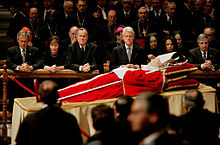 Bush, along with George W. Bush, Laura Bush, Bill Clinton, Condoleezza Rice, and Andrew Card pay their respects to Pope John Paul II before the pope's funeral, 2005
Bush, along with George W. Bush, Laura Bush, Bill Clinton, Condoleezza Rice, and Andrew Card pay their respects to Pope John Paul II before the pope's funeral, 2005
Upon leaving office, Bush retired with his wife, Barbara, to their home in the exclusive neighborhood of Tanglewood in Houston, with a presidential office nearby. They spend the summer at Walker's Point in Kennebunkport, Maine. On January 10, 1999, the Bushes became the longest-married Presidential couple in history, outlasting John and Abigail Adams, who were married for 54 years and 3 days. At 66 years in 2011, they still hold the record, by a year and a half, over Jimmy and Rosalynn Carter. Bush holds his own fishing tournament in Islamorada, an island in the Florida Keys.
In 1993, Bush was awarded an honorary knighthood (GCB) by Queen Elizabeth II. He was the third American president to receive the honor, the others being Dwight D. Eisenhower and Ronald Reagan.[101]
In 1993, Bush visited Kuwait to commemorate the coalition's victory over Iraq in the Gulf War, where he was targeted in an assassination plot. Kuwaiti authorities arrested 17 people allegedly involved in using a car bomb to kill Bush. Through interviews with the suspects and examinations of the bomb's circuitry and wiring, the FBI established that the plot had been directed by the Iraqi Intelligence Service. A Kuwaiti court later convicted all but one of the defendants. Two months later, in retaliation, Clinton ordered the firing of 23 cruise missiles at Iraqi Intelligence Service headquarters in Baghdad. The day before the strike commenced, U.S. Ambassador to the UN Madeleine Albright went before the Security Council to present evidence of the Iraqi plot. After the missiles were fired, Vice President Al Gore said the attack "was intended to be a proportionate response at the place where this plot" to assassinate Bush "was hatched and implemented".[102]
From 1993–1999, he served as the chairman to the board of trustees for Eisenhower Fellowships.
His eldest son, George W. Bush, was inaugurated as the 43rd President of the United States on January 20, 2001. Through previous administrations, the elder Bush had ubiquitously been known as "George Bush" or "President Bush", but following his son's election the need to distinguish between them has made retronymic forms such as "George H. W. Bush" and "George Bush senior" – and colloquialisms such as "Bush 41" and "Bush the Elder" much more common.
On February 15, 2011 he was awarded the Medal of Freedom—the highest civilian honor in the United States—by President Barack Obama.[103]
Bush has developed Parkinsonism, a vascular disorder which has weakened his legs. In April 2011 he said he was not suffering pain from the disorder.[30][104]
Presidential library
Main article: George Bush Presidential LibraryThe George Bush Presidential Library is the presidential library named for Bush. This tenth presidential library was built between 1995 and 1997 and contains the presidential and vice-presidential papers of Bush and the vice-presidential papers of Dan Quayle.[105] It was dedicated on November 6, 1997 and opened to the public shortly thereafter; the complex was designed by the architectural firm of Hellmuth, Obata and Kassabaum.
The George Bush Presidential Library and Museum is located on a 90-acre (360,000 m2) site on the west campus of Texas A&M University in College Station, Texas. It is situated on a plaza adjoining the Presidential Conference Center and the Texas A&M Academic Center. The Library operates under the administration of the NARA under the provisions of the Presidential Libraries Act of 1955.
Another institute was named in his honor: the George Bush School of Government and Public Service is a graduate public policy school at Texas A&M University in College Station, Texas. The graduate school is part of the presidential library complex, and offers four programs: two master's degree programs (Public Service Administration and International Affairs) and two certificate programs (Advanced International Affairs and Homeland Security). The Masters program in International Affairs (MPIA) program offers a choice of concentration on either National Security Affairs or International Economics and Development.
Later activities
The former president continues to make many public appearances. He and Mrs. Bush attended the state funeral of Ronald Reagan in June 2004, and of Gerald Ford in January 2007. One month later, he was awarded the Ronald Reagan Freedom Award in Beverly Hills, California by former First Lady Nancy Reagan. Despite his political differences with Bill Clinton, it has been acknowledged that the two former presidents have become friends.[106] He and Clinton appeared together in television ads in 2005, encouraging aid for victims of Hurricane Katrina and the 2004 Indian Ocean tsunami.[107]
In October 2006, Bush was honored by the National Italian American Foundation (NIAF), receiving the NIAF One America Award for his work to better the lives of all Americans.
On February 18, 2008, Bush formally endorsed Senator John McCain for the presidency of the United States.[108] The endorsement offered a boost to McCain's campaign, as the Arizona Senator had been facing criticism among many conservatives.[109]
On January 10, 2009, Bush and his son were both present at the commissioning of the USS George H. W. Bush (CVN-77), the tenth and last Nimitz class supercarrier of the United States Navy.[110][111] Bush paid a visit to the carrier again on May 26, 2009.[112]
Electoral history
See also: Electoral history of George H. W. BushNotes
- ^ "Presidential Avenue: George Bush". Presidential Avenue. http://www.presidentialavenue.com/gb.cfm. Retrieved March 29, 2008.
- ^ a b "Former President George Bush honored at his 60th reunion at Phillips Academy, Andover". Phillips Academy. June 8, 2002. Archived from the original on April 1, 2008. http://web.archive.org/web/20080401131455/http://www.andover.edu/news/bush.htm. Retrieved March 29, 2008.
- ^ Adams, Kathy (January 10, 2009). "San Jacinto veterans reunite, recall the one they called 'Skin'". The Virginian Pilot (Landmark Communications). http://hamptonroads.com/2009/01/san-jacinto-veterans-reunite-recall-serving-bush. Retrieved January 10, 2009.
- ^ "Story of George H. W. Bush World War II Experience". CNN. December 20, 2003.
- ^ a b c d "History’s Youngest Naval Aviator: George H. W. Bush". Mid-Atlantic Air Museum. http://www.maam.org/flightsim/news/tbm_history.htm. Retrieved March 29, 2008.
- ^ "George Herbert Walker Bush (1924–)". Miller Center of Public Affairs. 2008. http://millercenter.org/academic/americanpresident/bush. Retrieved March 29, 2008.
- ^ a b c "School House to White House: The Education of the Presidents". National Archives. Spring 2007. http://www.archives.gov/publications/prologue/2007/spring/schoolhouse.html. Retrieved March 29, 2008.
- ^ a b c "George Herbert Walker Bush". CNN. Archived from the original on March 8, 2008. http://web.archive.org/web/20080308132103/http://www.cnn.com/SPECIALS/cold.war/kbank/profiles/bush/. Retrieved March 29, 2008.
- ^ a b c d e f g h i j k l m n o p q r s t u v w x y z aa ab ac ad ae af ag ah ai aj ak al "George Herbert Walker Bush". George Herbert Walker Bush. MSN Encarta. http://encarta.msn.com/encyclopedia_761571000/George_H_W_Bush.html. Retrieved March 29, 2008. Archive copy at the Wayback Machine
- ^ a b c d e f g h i j k l m n o p q r s t u v w x y "Bush, George Herbert Walker". Scholastic Library Publishing, Inc. Archived from the original on June 15, 2008. http://web.archive.org/web/20080615195838/http://198.181.165.52/article?assetid=0068080-00&templatename=/article/article.html. Retrieved March 29, 2008.
- ^ "George Herbert Walker Bush". Net Industries. http://law.jrank.org/pages/4940/Bush-George-Herbert-Walker.html. Retrieved March 29, 2008.
- ^ "TX US Senate". Our Campaigns. http://www.ourcampaigns.com/RaceDetail.html?RaceID=30376. Retrieved March 19, 2008.
- ^ "TX District 07". Our Campaigns. http://www.ourcampaigns.com/RaceDetail.html?RaceID=47440. Retrieved March 19, 2008.
- ^ "TX District 7". Our Campaigns. http://www.ourcampaigns.com/RaceDetail.html?RaceID=180430. Retrieved March 19, 2008.
- ^ "TX US Senate – R Primary". Our Campaigns. http://www.ourcampaigns.com/RaceDetail.html?RaceID=278800. Retrieved March 19, 2008.
- ^ "TX US Senate". Our Campaigns. http://www.ourcampaigns.com/RaceDetail.html?RaceID=6529. Retrieved March 19, 2008.
- ^ ""Richard Nixon: Remarks at Longview, Texas", October 28, 1970". presidency.ucsb.edu. http://www.presidency.ucsb.edu/ws/index.php?pid=2776. Retrieved November 29, 2009.
- ^ "The President (Richard Nixon)". Richard Nixon Presidential Library. http://nixon.archives.gov/thelife/apolitician/thepresident/index.php. Retrieved March 29, 2008.
- ^ "George HW on Nixon resignation". US News and World Report. July 16, 2006. http://www.usnews.com/usnews/news/articles/060716/16bushonnixon_eye.htm. Retrieved March 29, 2008.
- ^ a b c d e f g h i j k l m n o p q r s t u v w x y z aa ab ac Hatfield, Mark with the Senate Historical Office (1997). "Vice Presidents of the United States: George H. W. Bush (1981–1989)" (PDF). Washington, D.C.: US Government Printing Office. http://www.senate.gov/artandhistory/history/resources/pdf/george_bush.pdf. Retrieved April 2, 2008.
- ^ Carl Colby (director) (September 2011). The Man Nobody Knew: In Search of My Father, CIA Spymaster William Colby (Motion picture). New York City: Act 4 Entertainment. http://firstrunfeatures.com/themannobodyknew/. Retrieved 2011.
- ^ "The George Bush Center for Intelligence". Central Intelligence Agency. April 5, 2007. https://www.cia.gov/about-cia/todays-cia/george-bush-center-for-intelligence/index.html. Retrieved September 5, 2011.
- ^ "Presidents: George H. W. Bush, 41st President of the United States". U-S-History.com. http://www.u-s-history.com/pages/h2025.html. Retrieved March 29, 2008.
- ^ "CIA Briefings of Presidential Candidates; Chapter 5: In-Depth Discussions With Carter". Central Intelligence Agency: Center for the Study of Intelligence. https://www.cia.gov/library/center-for-the-study-of-intelligence/csi-publications/books-and-monographs/cia-briefings-of-presidential-candidates/cia-8.htm. Retrieved October 11, 2007.
- ^ "George H. W. Bush". Presidential Timeline of the Twentieth Century. http://www.presidentialtimeline.org/html/timeline.php?id=41. Retrieved March 29, 2008.
- ^ a b "President George H. W. Bush: Kyiv National Taras Shevchenko University". Ukrainian Embassy. May 21, 2004. Archived from the original on May 19, 2008. http://web.archive.org/web/20080519115716/http://kiev.usembassy.gov/files/georgehwbush_speech_May04_eng.html. Retrieved March 29, 2008.
- ^ "The Council on Foreign Relations from 1921 to 1996 – Historical Roster of Directors and Officers". http://www.cfr.org/about/history/cfr/appendix.html.
- ^ Bumiller, Elisabeth (July 8, 2002). "White House Letter; At Parents' Home, Bush Resumes Role of Son". The New York Times. http://query.nytimes.com/gst/fullpage.html?res=9901EFDD1630F93BA35754C0A9649C8B63. Retrieved April 2, 2008.
- ^ a b John Solomon (March 20, 2011). "A Wimp He Wasn’t". Newsweek. http://www.newsweek.com/2011/03/20/a-wimp-he-wasn-t.html. Retrieved May 22, 2011.
- ^ "Bush-Ferraro Vice-Presidential Debate". The American Presidency Project. October 11, 1984. Archived from the original on June 17, 2008. http://web.archive.org/web/20080617164446/http://www.presidency.ucsb.edu/showdebate.php?debateid=27. Retrieved April 3, 2008.
- ^ "Transcript" (fee required). The New York Times. June 30, 1997. http://www.nytimes.com/books/97/06/29/reviews/iran-transcript.html. Retrieved April 2, 2008.
- ^ "The Iran-Contra Affair 20 Years On". George Washington University. November 20, 2006. http://www.gwu.edu/~nsarchiv/NSAEBB/NSAEBB210/index.htm. Retrieved April 3, 2008.
- ^ The Iran-Contra Affair 20 Years On
- ^ Apple Jr, R. W. (February 10, 1988). "Bush and Simon Seen as Hobbled by Iowa's Voting". The New York Times. http://query.nytimes.com/gst/fullpage.html?res=940DE2DC143CF933A25751C0A96E948260. Retrieved April 4, 2008.
- ^ "New Hampshire: Picking a President". The History Channel. Archived from the original on April 24, 2008. http://web.archive.org/web/20080424102704/http://www.history.com/minisite.do?content_type=Minisite_Generic&display_order=1&content_type_id=57687&mini_id=57351. Retrieved April 4, 2008.
- ^ a b c d "1988: George H. W. Bush Gives the 'Speech of his Life'". NPR. 2000. http://www.npr.org/news/national/election2000/conventions/past.bushsenior.html. Retrieved April 4, 2008.
- ^ a b c "1988: Bush wins with 'no new taxes' promise". BBC. November 9, 1988. http://news.bbc.co.uk/onthisday/hi/dates/stories/november/9/newsid_3655000/3655368.stm. Retrieved April 4, 2008.
- ^ "The Second Bush-Dukakis Presidential Debate". Commission on Presidential debates. October 13, 1988. Archived from the original on April 6, 2008. http://web.archive.org/web/20080406032116/http://www.debates.org/pages/trans88b.html. Retrieved April 4, 2008.
- ^ a b c "George H. W. Bush". The White House. http://www.whitehouse.gov/history/presidents/gb41.html. Retrieved April 11, 2008.
- ^ Gallup, George W.The Gallup Poll: Public Opinion, 1991, Published 1992, Rowman & Littlefield
- ^ "George H. W. Bush: Inaugural Address". Bushlibrary.tamu.edu. January 20, 1989. Archived from the original on April 20, 2004. http://web.archive.org/web/20040420073736/http://bushlibrary.tamu.edu/research/papers/1989/89012000.html.
- ^ "George Bush: Remarks on the 20th Anniversary of the Apollo 11 Moon Landing". Presidency.ucsb.edu. July 16, 1969. http://www.presidency.ucsb.edu/ws/index.php?pid=17321. Retrieved May 22, 2011.
- ^ "Encyclopedia of Minorities in American Politics: African Americans and Asian Americans". Jeffrey D. Schultz (2000). Greenwood Publishing Group. p.282. ISBN 1-57356-148-7
- ^ "The Paper curtain: employer sanctions' implementation, impact, and reform". Michael Fix (1991). The Urban Insitute. p.304. ISBN 0-87766-550-8
- ^ Carter, Gregg Lee (2002). Volume 1 of Guns in American Society: An Encyclopedia of History, Politics, Culture, and the Law. ABC-CLIO. p. 38. ISBN 9781576072684.
- ^ Tatalovich, Raymond; Byron W. Daynes (1998). Moral controversies in American politics: cases in social regulatory policy (2 ed.). M.E. Sharpe. pp. 168–175. ISBN 9781563249945.
- ^ Levine, Dan. "Gay judge never considered dropping Prop 8 case". Reuters. http://www.reuters.com/article/2011/04/06/us-gaymarriage-judge-idUSTRE7356TA20110406. Retrieved April 6, 2011.
- ^ Congressional Chronicle, C-SPAN (March 7, 2000).
- ^ a b c "Prudence in Panama: George H. W. Bush, Noriega, and economic aid, May 1989 – May 1990". Texas A&M University. April 25, 2007. https://txspace.tamu.edu/handle/1969.1/4731. Retrieved April 11, 2008.
- ^ a b c d e Franklin, Jane (2001). "Panama: Background and Buildup to Invasion of 1989". Rutgers University. http://andromeda.rutgers.edu/~hbf/panama.htm. Retrieved April 11, 2008.
- ^ a b "Richard B. Cheney: 17th Secretary of Defense". United States Department of Defense. http://www.defenselink.mil/specials/secdef_histories/bios/cheney.htm. Retrieved April 11, 2008.
- ^ Baker, Russell (January 3, 1990). "Observer; Is This Justice Necessary?". The New York Times. http://query.nytimes.com/gst/fullpage.html?res=9C0CE5DF123FF930A35752C0A966958260. Retrieved December 12, 2007.
- ^ John Pike, ed (April 27, 2005). "Operation Just Cause". http://www.globalsecurity.org/military/ops/just_cause.htm. Retrieved December 12, 2007.
- ^ a b c "Interview with Dr. Condoleezza Rice". George Washington University. interview took place on December 17, 1997. http://www.gwu.edu/~nsarchiv/coldwar/interviews/episode-24/rice1.html. Retrieved April 11, 2008.
- ^ See Malta Summit for more information
- ^ "The Malta Summit; Transcript of the Bush-Gorbachev News Conference in Malta". The New York Times. Associated Press. December 4, 1989. http://query.nytimes.com/gst/fullpage.html?res=950DE1D7173FF937A35751C1A96F948260. Retrieved April 11, 2008.
- ^ "1989: Malta summit ends Cold War". BBC. December 3, 1989. http://news.bbc.co.uk/onthisday/hi/dates/stories/december/3/newsid_4119000/4119950.stm. Retrieved April 11, 2008.
- ^ a b c "1991: Superpowers to cut nuclear warheads". BBC. July 31, 1991. http://news.bbc.co.uk/onthisday/hi/dates/stories/july/31/newsid_4582000/4582773.stm. Retrieved April 11, 2008.
- ^ a b c d "The Gulf War: A Chronology". PBS. http://www.pbs.org/wgbh/pages/frontline/gulf/cron/. Retrieved April 11, 2008.
- ^ "George H. W. Bush: Address Before a Joint Session of the Congress on the Persian Gulf Crisis and the Federal Budget Deficit". speech delivered September 11, 1990. http://bushlibrary.tamu.edu/research/public_papers.php?id=2217&year=1990&month=9.
- ^ "A World Transformed". Snopes.com. 2003. http://www.snopes.com/politics/quotes/gulfwar.asp. Retrieved April 11, 2008.
- ^ Middle East Review of International Affairs Journal Volume 6, No. 1 – March 2002 Underwriting Peace in the Middle East: U.S. Foreign Policy and the Limits of Economic Inducements
- ^ "UNITED NATIONS OPERATION IN SOMALIA I, UN Dept of Peacekeeping". United Nations. http://www.un.org/Depts/DPKO/Missions/unosomi.htm. Retrieved May 22, 2011.
- ^ Security Council Resolution 794
- ^ Bush, George H., Address to the Nation on the Situation in Somalia, 4/12/92
- ^ Rick Atkinson (January 31, 1994). The Washington Post.
- ^ a b "Frequently Asked Questions: NAFTA". Federal Express. http://www.fedex.com/us/customersupport/ftn/faq/nafta.html?link=4. Retrieved April 11, 2008.
- ^ a b c "The NAFTA Labor Side Accord". Human Rights Watch. http://www.hrw.org/reports/2001/nafta/nafta0401-04.htm. Retrieved April 11, 2008.
- ^ "NAFTA". Duke University. http://www.law.duke.edu/lib/researchguides/nafta.html. Retrieved April 11, 2008.
- ^ a b Gutierrez, Carlos M (March 1, 2008). "Stop Hating on NAFTA". The Washington Post. http://www.washingtonpost.com/wp-dyn/content/article/2008/02/29/AR2008022902608.html. Retrieved April 11, 2008.
- ^ Sweeney, John J (March 21, 2005). "A Bad Deal on Free Trade". The Boston Globe. Common Dreams News Center. http://www.commondreams.org/views05/0321-31.htm. Retrieved April 11, 2008.
- ^ a b "Bush pardons Weinberger, Five Other Tied to Iran-Contra". Federation of American Scientists. http://www.fas.org/news/iran/1992/921224-260039.htm. Retrieved April 11, 2008.
- ^ "Pardons and Commutations Granted by President George H. W. Bush". United States Department of Justice. http://www.usdoj.gov/pardon/bushgrants.htm. Retrieved May 17, 2008.
- ^ a b c "Maybe I'm Amazed". Snopes.com. April 1, 2001. http://www.snopes.com/history/american/bushscan.htm. Retrieved April 11, 2008.
- ^ "The Perot Vote". President and Fellows of Harvard College. http://www.hks.harvard.edu/case/3pt/perot_vote.html. Retrieved April 23, 2008.
- ^ Holmes, Steven A (October 27, 1992). "The 1992 Campaign: The Independent; Bush Aide calls Perot's story 'paranoid'". The New York Times. http://query.nytimes.com/gst/fullpage.html?res=9E0CEED71331F934A15753C1A964958260&sec=&spon=&pagewanted=all. Retrieved April 14, 2008.
- ^ Toner, Robin (October 25, 1992). "The 1992 Campaign: The Overview; Contest tightens as Perot Resurges and Clinton slips". The New York Times. http://query.nytimes.com/gst/fullpage.html?res=9E0CE5DC1E3AF936A15753C1A964958260. Retrieved April 14, 2008.
- ^ Holmes, Steven A. (November 5, 1992). "THE 1992 ELECTIONS: DISAPPOINTMENT – NEWS ANALYSIS An Eccentric but No Joke; Perot's Strong Showing Raises Questions On What Might Have Been, and Might Be –". New York Times. http://query.nytimes.com/gst/fullpage.html?res=9E0CE0DB1F3FF936A35752C1A964958260. Retrieved September 5, 2010.
- ^ "George Herbert Walker Bush: Campaigns and Elections". Miller Center of Public Affairs. http://millercenter.org/academic/americanpresident/bush/essays/biography/3. Retrieved April 11, 2008.
- ^ Schmalz, Jeffrey (November 4, 1992). "Clinton Carves a Path Deep Into Reagan Country". The New York Times. http://query.nytimes.com/gst/fullpage.html?res=9E0CEFD8173FF937A35752C1A964958260&scp=1&sq=Clinton+Carves+a+Wide+Path+Deep+Into+Reagan+Country&st=nyt. Retrieved May 21, 2008.
- ^ By R. W. Apple Jr. (November 4, 1992). "THE 1992 ELECTIONS: NEWS ANALYSIS; The Economy's Casualty –". New York Times (Pennsylvania; Ohio; New England States (Us); Michigan; West Coast; New Jersey; Middle East). http://query.nytimes.com/gst/fullpage.html?res=9E0CE5D81439F937A35752C1A964958260. Retrieved September 5, 2010.
- ^ Lazarus, David (June 9, 2004). "Downside of the Reagan Legacy". The San Francisco Chronicle. http://www.sfgate.com/cgi-bin/article.cgi?file=/chronicle/archive/2004/06/09/BUGBI72U8Q1.DTL&type=business. Retrieved April 11, 2008.
- ^ "Presidency on Life Support". Pollingreport.com. http://www.pollingreport.com/whitejk.htm. Retrieved September 5, 2010.
- ^ "WSJ.com". The Wall Street Journal. http://online.wsj.com/public/resources/documents/info-presapp0605-31.html. Retrieved September 5, 2010.
- ^ Langer, Gary (January 17, 2001). "Poll: Clinton Legacy Mixed". ABC. http://abcnews.go.com/sections/politics/DailyNews/poll%5Fclintonlegacy010117.html. Retrieved April 11, 2008.
- ^ "The Independent, ' ' George H. W. Bush". The Independent (UK). January 22, 2009. http://www.independent.co.uk/news/presidents/george-h-w-bush-1482924.html. Retrieved September 5, 2010.
- ^ "The Prudence Thing: George Bush's Class Act". Foreign Affairs. November 1, 1998. http://www.foreignaffairs.com/articles/54609/michael-howard/the-prudence-thing-george-bush-s-class-act. Retrieved September 5, 2010.
- ^ Ajemian, Robert (January 26, 1987). "Where Is the Real George Bush?". Time. http://www.time.com/time/magazine/article/0,9171,963342-2,00.html. Retrieved May 3, 2010.
- ^ "Quotations : Oxford Dictionaries Online". Askoxford.com. http://www.askoxford.com/worldofwords/quotations/phrasefable/visionthing/?view=uk. Retrieved September 5, 2010.
- ^ "Listen Up, Mr. President: Everything You Always Wanted Your President to Know and Do (9781439148150): Helen Thomas, Craig Crawford: Books". Amazon.com. December 7, 1941. http://www.amazon.com/Listen-Up-Mr-President-Everything/dp/product-description/1439148155. Retrieved September 5, 2010.
- ^ "Joseph A. Palermo: Meg Whitman's "Vision Thing"". Huffington Post. http://www.huffingtonpost.com/joseph-a-palermo/meg-whitmans-vision-thing_b_300845.html. Retrieved September 5, 2010.
- ^ "It's time to do the 'vision' thing: Times Argus Online". Timesargus.com. September 29, 2009. http://www.timesargus.com/article/20090929/NEWS02/909290341/1003/NEWS02. Retrieved September 5, 2010.
- ^ Posted by ZbigniewMazurak. "Blog Archive » Sarah Palin as a GOP Nominee?". The Reality Check. http://www.therealitycheck.org/?p=7492. Retrieved September 5, 2010.
- ^ "rothkopf.foreignpolicy.com". rothkopf.foreignpolicy.com. http://rothkopf.foreignpolicy.com/posts/2009/10/01/barack_obama_does_not_want_to_become_known_as_the_great_ditherer. Retrieved September 5, 2010.
- ^ a b "george herbert walker bush". Docstoc.com. http://www.docstoc.com/docs/5799203/george-herbert-walker-bush. Retrieved September 5, 2010.
- ^ "George H. W. Bush | The White House". Whitehouse.gov. June 12, 1924. http://www.whitehouse.gov/about/presidents/georgehwbush/. Retrieved September 5, 2010.
- ^ "Modest Bush Approval Rating Boost at War's End: Summary of Findings – Pew Research Center for the People & the Press". People-press.org. http://people-press.org/report/182/modest-bush-approval-rating-boost-at-wars-end. Retrieved September 5, 2010.
- ^ a b "American Experience . George H. W. Bush". PBS. October 3, 1990. http://www.pbs.org/wgbh/amex/bush41/program/intro.html. Retrieved September 5, 2010.
- ^ By Paul Steinhauser CNN. "CNN, Views soften on 2 former presidents, CNN poll finds". CNN. http://www.cnn.com/2009/POLITICS/01/07/polls.former.presidents/index.html#cnnSTCText. Retrieved September 5, 2010.
- ^ "Honours: Order of the Bath". The British Monarchy Today. Archived from the original on May 30, 2008. http://web.archive.org/web/20080530062826/http://www.royal.gov.uk/output/page4883.asp. Retrieved March 28, 2008.
- ^ "frontline: the long road to war: assassination". PBS. http://www.pbs.org/wgbh/pages/frontline/shows/longroad/etc/assassination.html. Retrieved September 5, 2010.
- ^ Kori Schulman. "Watch Live: President Obama Honors Presidential Medal of Freedom Recipients | The White House". Whitehouse.gov. http://www.whitehouse.gov/blog/2011/02/15/watch-live-president-obama-honors-presidential-medal-freedom-recipients. Retrieved May 22, 2011.
- ^ Duffy, Michael (April 28, 2011). "10 Questions for George H.W. Bush Time April 28, 2011". TIME. http://www.time.com/time/nation/article/0,8599,2067951,00.html. Retrieved May 22, 2011.
- ^ "The Birth of the Tenth Presidential Library: The Bush Presidential Materials Project, 1993–1994". George Bush Presidential Library. Archived from the original on April 10, 2007. http://web.archive.org/web/20070410185146/http://bushlibrary.tamu.edu/giq.html. Retrieved March 22, 2007.
- ^ Healy, Patrick (May 19, 2007). "A Candidacy That May Test a Friendship’s Ties". New York Times. http://www.nytimes.com/2007/05/19/us/politics/19memo.html. Retrieved May 22, 2011.
- ^ "ABC News: People of the Year: Bill Clinton and George H. W. Bush". Abcnews.go.com. December 27, 2005. http://abcnews.go.com/WNT/PersonOfWeek/story?id=1446477. Retrieved September 5, 2010.
- ^ "George H. W. Bush Endorses McCain for President". The Washington Post. February 18, 2008. http://www.washingtonpost.com/wp-dyn/content/article/2008/02/18/AR2008021800930.html?nav=rss_politics. Retrieved March 28, 2008.
- ^ Neuman, Johanna (February 18, 2008). "Former President Bush Endorses McCain". The Los Angeles Times. Archived from the original on March 14, 2008. http://web.archive.org/web/20080314155546/http://www.latimes.com/news/politics/la-na-campaign19feb19,0,856707.story. Retrieved March 28, 2008.
- ^ Jones, Matthew (January 10, 2009). "Carrier awaits a call to come to life in ceremony today". The Virginian Pilot (Landmark Communications). http://hamptonroads.com/2009/01/carrier-awaits-call-come-life-ceremony-today. Retrieved January 10, 2009.
- ^ "Former President Bush Visits Namesake Aircraft Carrier". http://www.navy.mil/search/display.asp?story_id=45678.
Further reading
- Barilleaux, Ryan J.; Stuckey, Mary E. (1992). Leadership and the Bush Presidency: Prudence or Drift in an Era of Change. New York: Praeger. ISBN 0-275-94418-2.
- Bush, George H. W. (1999). All the Best, George Bush: My Life in Letters and Other Writings. New York: Scribner. ISBN 0-684-83958-X.
- Bush, George H. W.; Scowcroft, Brent (1998). A World Transformed. New York: Knopf. ISBN 0-679-43248-5.
- Ducat, Stephen J. (2004). The Wimp Factor: Gender Gaps, Holy Wars, and the Politics of Anxious Masculinity. Boston: Beacon Press. ISBN 0-8070-4344-3.
- Duffy, Michael; Goodgame, Dan (1992). Marching in Place : The Status Quo Presidency of George Bush. New York: Simon & Schuster. ISBN 0-671-73720-1.
- Fitzwater, Marlin (1995). Call the Briefing. New York: Times Books. ISBN 9780738834580.
- Green, John Robert (2000). The Presidency of George Bush. Lawrence: University Press of Kansas. ISBN 0-7006-0993-8.
- Hyams, Joe (1991). Flight of the Avenger: George Bush at War. San Diego: Harcourt Brace Jovanovic. ISBN 0-15-131469-1.
- Kelley, Kitty (2004). The Family: The True Story of the Bush Dynasty. London: Doubleday. ISBN 0-385-50324-5.
- Podhoretz, John (1993). Hell of a Ride: Backstage at the White House Follies, 1989–1993. New York: Simon & Schuster. ISBN 0-671-79648-8.
- Smith, Jean Edward (1992). George Bush's War. New York: Henry Holt & Company. ISBN 0-8050-1388-1.
- Tarpley, Webster G.; Chaitkin, Anton (1991, reprinted 2004). George Bush: The Unauthorized Biography. Washington: Executive Intelligence Review. ISBN 0-930852-92-3.
- UFOs and the Whitehouse (Documentary). History Channel. 25 july 2005. http://en.wikipedia.org/wiki/Ufo_files#2006_season. Retrieved December 26, 2008.
External links
- Bush Presidential Library and Museum
- White House biography
- George Bush at the Internet Movie Database
- Works by George Bush at Project Gutenberg Note: Contains only Bush's 1990 State of the Union address
- George H. W. Bush at the Biographical Directory of the United States Congress
- Essays on Bush and His Administration
- The President Who Treated Me Like A Son, brief memoir by his personal aide
- Photographs of President George H. W. Bush shaking hands with Philip G. Hoffman at a University of Houston commencement ceremony.
Articles Related to George H. W. Bush Presidents of the United States 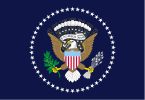
- George Washington
- John Adams
- Thomas Jefferson
- James Madison
- James Monroe
- John Quincy Adams
- Andrew Jackson
- Martin Van Buren
- William Henry Harrison
- John Tyler
- James K. Polk
- Zachary Taylor
- Millard Fillmore
- Franklin Pierce
- James Buchanan
- Abraham Lincoln
- Andrew Johnson
- Ulysses S. Grant
- Rutherford B. Hayes
- James A. Garfield
- Chester A. Arthur
- Grover Cleveland
- Benjamin Harrison
- Grover Cleveland
- William McKinley
- Theodore Roosevelt
- William Howard Taft
- Woodrow Wilson
- Warren G. Harding
- Calvin Coolidge
- Herbert Hoover
- Franklin D. Roosevelt
- Harry S. Truman
- Dwight D. Eisenhower
- John F. Kennedy
- Lyndon B. Johnson
- Richard Nixon
- Gerald Ford
- Jimmy Carter
- Ronald Reagan
- George H. W. Bush
- Bill Clinton
- George W. Bush
- Barack Obama
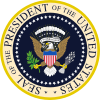
Republican Party Chairpersons
of the RNC- Morgan
- Raymond
- Ward
- Claflin
- Morgan
- Chandler
- Cameron
- Jewell
- Sabin
- Jones
- Quay
- Clarkson
- Carter
- Hanna
- Payne
- Cortelyou
- New
- Hitchcock
- Hill
- Rosewater
- Hilles
- Wilcox
- Hays
- Adams
- Butler
- Work
- Huston
- Fess
- Sanders
- Fletcher
- Hamilton
- Martin
- Walsh
- Spangler
- Brownell
- Reece
- Scott
- Gabrielson
- Summerfield
- Roberts
- Hall
- Alcorn
- T. B. Morton
- Miller
- Burch
- Bliss
- R. Morton
- Dole
- Bush
- Smith
- Brock
- Richards
- Fahrenkopf
- Atwater
- Yeutter
- Bond
- Barbour
- Nicholson
- Gilmore
- Racicot
- Gillespie
- Mehlman
- Martinez
- Duncan
- Steele
- Priebus
Presidential tickets - Frémont/Dayton
- Lincoln/Hamlin
- Lincoln/Johnson
- Grant/Colfax
- Grant/Wilson
- Hayes/Wheeler
- Garfield/Arthur
- Blaine/Logan
- Harrison/Morton
- Harrison/Reid
- McKinley/Hobart
- McKinley/Roosevelt
- Roosevelt/Fairbanks
- Taft/Sherman/Butler
- Hughes/Fairbanks
- Harding/Coolidge
- Coolidge/Dawes
- Hoover/Curtis
- Landon/Knox
- Willkie/McNary
- Dewey/Bricker
- Dewey/Warren
- Eisenhower/Nixon
- Nixon/Lodge
- Goldwater/Miller
- Nixon/Agnew
- Ford/Dole
- Reagan/G. H. W. Bush
- G. H. W. Bush/Quayle
- Dole/Kemp
- G. W. Bush/Cheney
- McCain/Palin
Parties by state
and territoryState- Alabama
- Alaska
- Arizona
- Arkansas
- California
- Colorado
- Connecticut
- Delaware
- Florida
- Georgia
- Hawaii
- Idaho
- Illinois
- Indiana
- Iowa
- Kansas
- Kentucky
- Louisiana
- Maine
- Maryland
- Massachusetts
- Michigan
- Minnesota
- Mississippi
- Missouri
- Montana
- Nebraska
- Nevada
- New Hampshire
- New Jersey
- New Mexico
- New York
- North Carolina
- North Dakota
- Ohio
- Oklahoma
- Oregon
- Pennsylvania
- Rhode Island
- South Carolina
- South Dakota
- Tennessee
- Texas
- Utah
- Vermont
- Virginia
- Washington
- West Virginia
- Wisconsin
- Wyoming
TerritoryConventions
(List)- 1856 (Philadelphia)
- 1860 (Chicago)
- 1864 (Baltimore)
- 1868 (Chicago)
- 1872 (Philadelphia)
- 1876 (Cincinnati)
- 1880 (Chicago)
- 1884 (Chicago)
- 1888 (Chicago)
- 1892 (Minneapolis)
- 1896 (Saint Louis)
- 1900 (Philadelphia)
- 1904 (Chicago)
- 1908 (Chicago)
- 1912 (Chicago)
- 1916 (Chicago)
- 1920 (Chicago)
- 1924 (Cleveland)
- 1928 (Kansas City)
- 1932 (Chicago)
- 1936 (Cleveland)
- 1940 (Philadelphia)
- 1944 (Chicago)
- 1948 (Philadelphia)
- 1952 (Chicago)
- 1956 (San Francisco)
- 1960 (Chicago)
- 1964 (San Francisco)
- 1968 (Miami Beach)
- 1972 (Miami Beach)
- 1976 (Kansas City)
- 1980 (Detroit)
- 1984 (Dallas)
- 1988 (New Orleans)
- 1992 (Houston)
- 1996 (San Diego)
- 2000 (Philadelphia)
- 2004 (New York)
- 2008 (St. Paul)
- 2012 (Tampa)
Affiliated
organizations- College Republicans
- Congressional Hispanic Conference
- International Democrat Union
- Log Cabin Republicans
- National Republican Congressional Committee
- National Republican Senatorial Committee
- Republican Conference of the United States House of Representatives
- Republican Conference of the United States Senate
- Republican Governors Association
- Republican Jewish Coalition
- Republican Liberty Caucus
- Republican Main Street Partnership
- Republican Majority for Choice
- Republican National Coalition for Life
- Republican National Hispanic Assembly
- Republican Study Committee
- Republicans Abroad
- Republicans for Environmental Protection
- The Ripon Society
- The Wish List
- Young Republicans
Related articles - History
- 2009 chairmanship election
- 2011 chairmanship election
- Bibliography
- Timeline of modern American conservatism
Vice Presidents of the United States 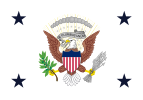
- John Adams
- Thomas Jefferson
- Aaron Burr
- George Clinton
- Elbridge Gerry
- Daniel D. Tompkins
- John C. Calhoun
- Martin Van Buren
- Richard Mentor Johnson
- John Tyler
- George M. Dallas
- Millard Fillmore
- William R. King
- John C. Breckinridge
- Hannibal Hamlin
- Andrew Johnson
- Schuyler Colfax
- Henry Wilson
- William A. Wheeler
- Chester A. Arthur
- Thomas A. Hendricks
- Levi P. Morton
- Adlai Stevenson I
- Garret Hobart
- Theodore Roosevelt
- Charles W. Fairbanks
- James S. Sherman
- Thomas R. Marshall
- Calvin Coolidge
- Charles G. Dawes
- Charles Curtis
- John Nance Garner
- Henry A. Wallace
- Harry S. Truman
- Alben W. Barkley
- Richard Nixon
- Lyndon B. Johnson
- Hubert Humphrey
- Spiro Agnew
- Gerald Ford
- Nelson Rockefeller
- Walter Mondale
- George H. W. Bush
- Dan Quayle
- Al Gore
- Dick Cheney
- Joe Biden
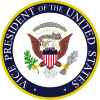
Directors of Central Intelligence and Central Intelligence Agency Central Intelligence 
Central Intelligence Agency - Porter J. Goss
- Michael Hayden
- Leon Panetta
- David Petraeus
United States Ambassadors to the United Nations Edward Stettinius, Jr. · Warren Austin · Henry Cabot Lodge, Jr. · James J. Wadsworth · Adlai Stevenson · Arthur Goldberg · George Ball · James R. Wiggins · Charles W. Yost · George H. W. Bush · John A. Scali · Daniel P. Moynihan · William Scranton · Andrew Young · Donald McHenry · Jeane Kirkpatrick · Vernon A. Walters · Thomas R. Pickering · Edward J. Perkins · Madeleine Albright · Bill Richardson · Richard Holbrooke · John Negroponte · John Danforth · John R. Bolton · Zalmay Khalilzad · Susan Rice United States Ambassadors to China
United States Ambassadors to China 
Envoys to the Qing Empire
1843-1858Caleb Cushing 1843-44 · Alexander Hill Everett 1845-47 · John Wesley Davis 1848-50 · Humphrey Marshall 1852-54 · Robert Milligan McLane 1853-54 · Peter Parker 1855-57 ·
William B. Reed 1857-58Envoy Extraordinary and Minister
Plentipotentiary to the Qing Empire
1858-1913John Elliott Ward 1858-60 · Anson Burlingame 1861-67 · John Ross Browne 1868-69 · Frederick F. Low 1869-73 · Benjamin Avery 1874-75 · George Seward 1876-80 · James Burrill Angell 1880-81 · John Russell Young 1882-85 · Charles Harvey Denby 1885-98 · Edwin H. Conger 1898-05 · William Woodville Rockhill 1905-09 · William James Calhoun 1909-13
Envoy to the Republic of China
1913-1929Paul Samuel Reinsch 1913-19 · Charles Richard Crane 1920-21 · Jacob Gould Schurman 1921-25 · John MacMurray 1925-29
Ambassador to the Republic of China
1929-1949Nelson T. Johnson 1929-41 · Clarence E. Gauss 1941-44 · Patrick J. Hurley 1944-45 · John Leighton Stuart 1946-49 · Embassy in Taipei 1949-Pres.
Chiefs of the U.S. Liaison Office in Beijing
1973-79David K. E. Bruce 1973-74 · George H. W. Bush 1974-75 · Thomas S. Gates, Jr. 1976-77 ·
Leonard Woodcock 1977-79Ambassador to the People's Republic of China
1979-PresentLeonard Woodcock 1979-81 · Arthur W. Hummel, Jr. 1981-85 · Winston Lord 1985-89 · James R. Lilley 1989-91 · J. Stapleton Roy 1991-95 · Jim Sasser 1996-99 · Joseph Prueher 1999-01 · Clark T. Randt, Jr. 2001-09 · Jon Huntsman, Jr. 2009-11 · Gary Locke 2011-
1940s Yalta Conference · Operation Unthinkable · Potsdam Conference · Gouzenko Affair · War in Vietnam (1945–1946) · Iran crisis of 1946 · Greek Civil War · Corfu Channel Incident · Restatement of Policy on Germany · First Indochina War · Truman Doctrine · Asian Relations Conference · Marshall Plan · Czechoslovak coup d'état of 1948 · Tito–Stalin split · Berlin Blockade · Western betrayal · Iron Curtain · Eastern Bloc · Chinese Civil War (Second round)1950s Korean War · 1953 Iranian coup d'état · Uprising of 1953 in East Germany · 1954 Guatemalan coup d'état · Partition of Vietnam · First Taiwan Strait Crisis · Geneva Summit (1955) · Poznań 1956 protests · Hungarian Revolution of 1956 · Suez Crisis · Sputnik crisis · Second Taiwan Strait Crisis · Cuban Revolution · Kitchen Debate · Asian–African Conference · Bricker Amendment · McCarthyism · Operation Gladio · Hallstein Doctrine1960s Congo Crisis · Sino–Soviet split · 1960 U-2 incident · Bay of Pigs Invasion · Berlin Wall · Cuban Missile Crisis · Vietnam War · 1964 Brazilian coup d'état · United States occupation of the Dominican Republic (1965–1966) · South African Border War · Rhodesian Bush War · Transition to the New Order · Domino theory · ASEAN Declaration · Laotian Civil War · Greek military junta of 1967–1974 · Six-Day War · War of Attrition · Cultural Revolution · Sino-Indian War · Prague Spring · Goulash Communism · Sino–Soviet border conflict1970s Détente · Nuclear Non-Proliferation Treaty · Black September in Jordan · Cambodian Civil War · Realpolitik · Ping Pong Diplomacy · Four Power Agreement on Berlin · 1972 Nixon visit to China · 1973 Chilean coup d'état · Yom Kippur War · Strategic Arms Limitation Talks · Angolan Civil War · Mozambican Civil War · Ogaden War · Sino-Albanian split · Cambodian–Vietnamese War · Sino-Vietnamese War · Iranian Revolution · Operation Condor · Bangladesh Liberation War · Korean Air Lines Flight 9021980s Soviet war in Afghanistan · 1980 and 1984 Summer Olympics boycotts · Solidarity (Soviet reaction) · Contras · Central American crisis · RYAN · Korean Air Lines Flight 007 · Able Archer 83 · Star Wars · Invasion of Grenada · People Power Revolution · Tiananmen Square protests of 1989 · United States invasion of Panama · Fall of the Berlin Wall · Revolutions of 1989 · Glasnost · Perestroika1990s Foreign
policyIdeologies Capitalism (Chicago school · Keynesianism · Monetarism · Neoclassical economics · Supply-side economics · Thatcherism · Reaganomics) · Communism (Marxism–Leninism · Castroism · Eurocommunism · Guevarism · Juche · Left communism · Maoism · Stalinism · Titoism · Trotskyism) · Liberal democracy · Social democracyOrganizations Propaganda Races See also Brinkmanship · NATO–Russia relations · Soviet and Russian espionage in U.S. · Soviet Union – United States relations · US–Soviet summitsNotable figures of the Cold WarSoviet Union Joseph Stalin · Vyacheslav Molotov · Andrei Gromyko · Nikita Khrushchev · Anatoly Dobrynin · Leonid Brezhnev · Alexei Kosygin · Yuri Andropov · Konstantin Chernenko · Mikhail Gorbachev · Nikolai Ryzhkov · Eduard Shevardnadze · Gennady Yanayev · Boris YeltsinUnited States Harry S. Truman · George Marshall · Joseph McCarthy · Dwight D. Eisenhower · John Foster Dulles · John F. Kennedy · Robert F. Kennedy · Henry Cabot Lodge, Jr. · Lyndon B. Johnson · Richard Nixon · Henry Kissinger · Gerald Ford · Jimmy Carter · Ronald Reagan · George Shultz · George H. W. BushPeople's Republic of China Japan West Germany United Kingdom Italy France Finland Spain People's Republic of Poland Canada Philippines Africa José Eduardo dos Santos · Jonas Savimbi (Angola) · Patrice Lumumba · Mobutu Sese Seko (Congo/Zaire) · Agostinho Neto · Mengistu Haile Mariam (Ethiopia) · Kwame Nkrumah (Ghana) · Julius Nyerere (Tanzania) · Idi Amin (Uganda) · Muammar Gaddafi (Libya)Eastern Bloc Enver Hoxha (Albania) · Todor Zhivkov (Bulgaria) · Alexander Dubček (Czechoslovakia) · Walter Ulbricht · Erich Honecker (East Germany) · Mátyás Rákosi · Imre Nagy · János Kádár (Hungary) · Nicolae Ceauşescu (Romania) · Josip Broz Tito (Yugoslavia)Latin America Juan Domingo Perón · Jorge Rafael Videla · Leopoldo Galtieri (Argentina) · Getúlio Vargas · Luís Prestes · Leonel Brizola · João Goulart · Castelo Branco (Brazil) · Salvador Allende · Augusto Pinochet (Chile) · Fidel Castro · Che Guevara (Cuba) · Daniel Ortega (Nicaragua) · Rómulo Betancourt (Venezuela)Middle East Mohammad Najibullah · Ahmad Shah Massoud (Afghanistan) · Gamal Abdel Nasser · Anwar Sadat (Egypt) · Mohammad Reza Pahlavi · Mohammad Mosaddegh · Ayatollah Khomeini (Iran) · Saddam Hussein (Iraq) · Menachem Begin (Israel)South and East Asia Sheikh Mujibur Rahman (Bangladesh) · U Nu · Ne Win (Burma) · Pol Pot (Cambodia) · Indira Gandhi · Jawaharlal Nehru (India) · Sukarno · Suharto · Mohammad Hatta · Adam Malik (Indonesia) · Kim Il-sung (North Korea) · Syngman Rhee · Park Chung-hee (South Korea) · Muhammad Ayub Khan · Zulfikar Ali Bhutto · Muhammad Zia-ul-Haq (Pakistan) · Chiang Kai-shek · Chiang Ching-kuo (Taiwan) · Ho Chi Minh (North Vietnam) · Ngo Dinh Diem (South Vietnam)George W. Bush Life 
Presidency First term · Second term · Cabinet · Domestic policy · Legislation and programs · Economic policy · Foreign policy · Bush Doctrine · Iraq War · Judicial appointments · Pardons · Presidential library · Efforts to impeachElections Public image Books In fiction Family Laura Bush (wife) · Barbara Pierce Bush (daughter) · Jenna Bush Hager (daughter) · George H. W. Bush (father) · Barbara Bush (mother) · Barney (dog) · Miss Beazley (dog) · India (cat)Cabinet of President George H. W. Bush (1989–1993) Cabinet Secretary of State James Baker (1989–1992) • Lawrence Eagleburger (1992–1993)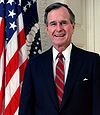
Secretary of the Treasury Nicholas F. Brady (1989–1993)Secretary of Defense Dick Cheney (1989–1993)Attorney General Dick Thornburgh (1989–1991) • William Barr (1991–1993)Secretary of the Interior Manuel Lujan, Jr. (1989–1993)Secretary of the Agriculture Clayton K. Yeutter (1989–1991) • Edward Rell Madigan (1991–1993)Secretary of Commerce Robert Mosbacher (1989–1992) • Barbara Hackman Franklin (1992 – 1993)Secretary of Labor Elizabeth Dole (1989 – 1990) • Lynn Morley Martin (1990 – 1993)Secretary of Health and Human Services Louis Wade Sullivan (1989–1993)Secretary of Education Lauro Cavazos (1989–1990) • Lamar Alexander (1991–1993)Secretary of Housing and Urban Development Jack Kemp (1989–1993)Secretary of Transportation Samuel K. Skinner (1989–1992) • Andrew Card (1992–1993)Secretary of Energy James D. Watkins (1989–1993)Secretary of Veterans Affairs Ed Derwinski (1989–1992)Cabinet-level Vice President Dan Quayle (1989–1993)Trade Representative Carla Anderson Hills (1989 – 1993)Director of the Office of
Management and BudgetRichard Darman (1989 – 1993)Cabinet of President Ronald Reagan (1981–1989) Cabinet Secretary of State 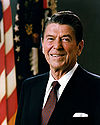
Secretary of the Treasury Secretary of Defense Attorney General Secretary of the Interior Secretary of Agriculture Secretary of Commerce Malcolm Baldrige, Jr. (1981–1987) · C. William Verity, Jr. (1987–1989)Secretary of Labor Secretary of Health and Human Services Secretary of Education Secretary of Housing and Urban Development Samuel R. Pierce, Jr. (1981–1989)Secretary of Transportation Secretary of Energy Cabinet-level Vice President George H. W. Bush (1981–1989)Director of Central Intelligence William J. Casey (1981–1987) · William H. Webster (1987–1989)Ambassador to the United Nations Trade Representative United States presidential election, 1968 Republican Party
Convention · PrimariesNominee: Richard Nixon (campaign)
VP Nominee: Spiro Agnew
Candidiates: Frank Carlson · Clifford Case · Hiram L. Fong · John Lindsay · Ronald Reagan · Jim Rhodes · Nelson Rockefeller · Winthrop Rockefeller · George W. Romney · (campaign) · Harold Stassen · John A. VolpeDemocratic Party
Convention · PrimariesNominee: Hubert Humphrey (campaign)
VP Nominee: Edmund Muskie
Candidates: Roger D. Branigin · John G. Crommelin · Paul C. Fisher · Lyndon B. Johnson · Robert F. Kennedy (campaign) · Thomas C. Lynch · Eugene McCarthy (campaign) · George McGovern · Dan K. Moore · Channing E. Phillips · George Smathers · Stephen M. YoungAmerican Independent Party Other Third party and independent candidates Communist Party USA Nominee: Charlene Mitchell
VP Nominee: Michael ZagarellPeace and Freedom Party Prohibition Party Nominee: E. Harold MunnSocialist Labor Party Nominee: Henning A. BlomenSocialist Workers Party Independents and other candidates: Other 1968 elections: House · SenateUnited States presidential election, 1980 Republican Party
Convention • Primaries •
Primary resultsNominee: Ronald Reagan
Candidates: John B. Anderson · Howard Baker · George H. W. Bush · John Connally · Phil Crane · Bob Dole · Ben Fernandez · Harold Stassen
VP Nominee: George H. W. BushDemocratic Party
Convention • Primaries •
Primary resultsNominee: Jimmy Carter
Candidates: Jerry Brown · Ted Kennedy · Ron Dellums · William Proxmire
VP Nominee: Walter MondaleIndependent Candidate: John B. Anderson
VP candidate: Patrick LuceyOther independent and third party candidates Citizens Party Libertarian Party Prohibition Party Socialist Party USA Socialist Workers Party Workers World Party Independents and other candidates Other 1980 elections: House • Senate • GubernatorialUnited States presidential election, 1984 Republican Party
Convention • Primaries •
Primary resultsDemocratic Party
Convention • Primaries •
Primary resultsNominee: Walter Mondale
Candidates: Reubin Askew · Alan Cranston · John Glenn · Gary Hart · Ernest Hollings · Jesse Jackson · George McGovern
VP Nominee: Geraldine FerraroThird party and independent candidates Citizens Party Communist Party USA Libertarian Party Prohibition Party Nominee: Earl DodgeSocialist Equality Party Socialist Party USA Socialist Workers Party Workers World Party Independents and other candidates: Other 1984 elections: House • Senate • GubernatorialUnited States presidential election, 1988 Republican Party
Convention • Primaries •
Primary resultsNominee: George H.W. Bush
Candidates: Bob Dole · Pete du Pont · Ben Fernandez · Alexander Haig · Jack Kemp · Paul Laxalt · Isabell Masters · Pat Robertson · Donald Rumsfeld · Harold Stassen
VP Nominee: Dan QuayleDemocratic Party
Convention • Primaries •
Primary resultsNominee: Michael Dukakis
Candidates: Douglas Applegate · Bruce Babbitt · Joe Biden (campaign) · David Duke · Dick Gephardt · Al Gore (campaign) · Gary Hart · Jesse Jackson (campaign) · Lyndon LaRouche · Andy Martin · Patricia Schroeder · Paul Simon · James Traficant
VP Nominee: Lloyd BentsenThird party and independent candidates Libertarian Party New Alliance Party Nominee: Lenora FulaniPopulist Party Nominee: David DukeProhibition Party Nominee: Earl DodgeSocialist Equality Party Nominee: Edward WinnSocialist Party USA Socialist Workers Party Nominee: James Warren
VP Nominee: Kathleen MickellsWorkers World Party Nominee: Larry Holmes
VP Nominee: Gloria La RivaIndependents and other candidates Other 1988 elections: House • Senate • GubernatorialUnited States presidential election, 1992 Democratic Party
Convention · PrimariesNominee: Bill Clinton (campaign)
Candidates: Larry Agran · Jerry Brown · Tom Harkin · Bob Kerrey · Lyndon LaRouche · Tom Laughlin · Eugene McCarthy · Paul Tsongas · Douglas Wilder · Charles Woods
VP Nominee: Al GoreRepublican Party
Convention · PrimariesNominee: George H.W. Bush
Candidates: Pat Buchanan · David Duke · Jack Fellure · Isabell Masters · Pat Paulsen · Tennie Rogers · Harold Stassen
VP Nominee: Dan QuayleIndependent Other independent and third party candidates Libertarian Party Natural Law Party New Alliance Party Prohibition Party Nominee: Earl DodgeSocialist Party USA Socialist Workers Party Nominee: James Warren
VP Nominee: Willie Mae ReidU.S. Taxpayers Party Nominee: Howard Phillips
VP Nominee: Albion Knight, Jr.Workers World Party Nominee: Gloria La Riva
VP Nominee: Larry HolmesIndependents and other candidates Time Persons of the Year - Jimmy Carter (1976)
- Anwar Sadat (1977)
- Deng Xiaoping (1978)
- Ayatollah Khomeini (1979)
- Ronald Reagan (1980)
- Lech Wałęsa (1981)
- The Computer (1982)
- Ronald Reagan / Yuri Andropov (1983)
- Peter Ueberroth (1984)
- Deng Xiaoping (1985)
- Corazon Aquino (1986)
- Mikhail Gorbachev (1987)
- The Endangered Earth (1988)
- Mikhail Gorbachev (1989)
- George H. W. Bush (1990)
- Ted Turner (1991)
- Bill Clinton (1992)
- “The Peacemakers”: Yitzhak Rabin / Nelson Mandela / F. W. de Klerk / Yasser Arafat (1993)
- Pope John Paul II (1994)
- Newt Gingrich (1995)
- David Ho (1996)
- Andrew Grove (1997)
- Bill Clinton / Ken Starr (1998)
- Jeffrey P. Bezos (1999)
- George W. Bush (2000)
- Complete roster
- 1927–1950
- 1951–1975
- 1976–2000
- 2001–present
National Football Foundation Gold Medal Winners 1958: Dwight D. Eisenhower | 1959: Douglas MacArthur | 1960: Herbert Hoover & Amos Alonzo Stagg | 1961: John F. Kennedy | 1962: Byron "Whizzer" White | 1963: Roger Q. Blough | 1964: Donold B. Lourie | 1965: Juan T. Trippe | 1966: Earl H. "Red" Blaik | 1967: Frederick L. Hovde | 1968: Chester J. LaRoche | 1969: Richard Nixon | 1970: Thomas J. Hamilton | 1971: Ronald Reagan | 1972: Gerald Ford | 1973: John Wayne | 1974: Gerald B. Zornow | 1975: David Packard | 1976: Edgar B. Speer | 1977: Louis H. Wilson | 1978: Vincent dePaul Draddy | 1979: William P. Lawrence | 1980: Walter J. Zable | 1981: Justin W. Dart | 1982: Silver Anniversary Awards (NCAA) - All Honored Jim Brown, Willie Davis, Jack Kemp, Ron Kramer, Jim Swink | 1983: Jack Kemp | 1984: John F. McGillicuddy | 1985: William I. Spencer | 1986: William H. Morton | 1987: Charles R. Meyer | 1988: Clinton E. Frank | 1989: Paul Brown | 1990: Thomas H. Moorer | 1991: George H. W. Bush | 1992: Donald R. Keough | 1993: Norman Schwarzkopf | 1994: Thomas S. Murphy | 1995: Harold Alfond | 1996: Gene Corrigan | 1997: Jackie Robinson | 1998: John H. McConnell | 1999: Keith Jackson | 2000: Fred M. Kirby II | 2001: Billy Joe "Red" McCombs | 2002: George Steinbrenner | 2003: Tommy Franks | 2004: William V. Campbell | 2005: Jon F. Hanson | 2006: Joe Paterno & Bobby Bowden | 2007: Pete Dawkins & Roger Staubach | 2008: John Glenn | 2009: Phil Knight & Bill Bowerman | 2010: Bill Cosby
Bush family Prescott Bush ancestors
Dorothy Walker Bush ancestorsSamuel Prescott Bush (1863–1948) • James Smith Bush (1825–1889) • Obadiah Newcomb Bush (1797–1851)
George Herbert Walker (1875–1953) • David Davis Walker (1840–1918) • George E. Walker (1797–1864) • Thomas Walker (1758–1799)Samuel P. Bush & Flora Sheldon Prescott Sheldon Bush (1895–1972) (m.) Dorothy Wear Walker (1901–1992) • Robert Bush • Mary House Bush • Margaret Clement Bush • James BushPrescott Bush (1895–1972) Prescott Bush Jr. (1922–2010) • George Herbert Walker Bush (m.) Barbara Pierce • Nancy Walker Bush Ellis (m.) Alexander B. Ellis II (1922–1989) • Jonathan James Bush (m.) Josephine Bradley • William Henry Trotter BushGeorge H. W. Bush (1924–)
Jonathan Bush (1931–)George Walker Bush (m.) Laura Lane Welch • Pauline Robinson Bush (1949–1953) • Jeb Bush (m.) Columba Garnica Gallo • Neil Mallon Bush (m.) Sharon Smith • Marvin Pierce Bush (m.) Margaret Molster • Dorothy Walker Bush (m./div. 1st) William LeBlond ; (m. 2nd) Robert P. Koch
Billy Bush (m.) Sydney Davis • Jonathan S. BushGeorge W. Bush (1946–)
Jeb Bush (1953–)
Neil Bush (1955–)
Marvin Bush (1956–)
Dorothy Koch (1959–)Barbara Pierce Bush • Jenna Welch Bush (m.) Henry Hager
George Prescott Bush (m.) Amanda Williams • Noelle Bush • John Ellis Bush, Jr.
Lauren Bush • Ashley Bush • Pierce Bush
Marshall Bush • Walker Bush
Sam LeBlond • Ellie LeBlond • Robert Koch • Gigi KochSee also The Bush Compound • Buckeye Steel Castings • G. H. Walker & Co. • The Family: The Real Story of the Bush Dynasty • Political lineCategories:- George H. W. Bush administration cabinet members
- George H. W. Bush
- 1924 births
- American anti-communists
- American oil industrialists
- American Episcopalians
- American people of Dutch descent
- American people of English descent
- American people of German descent
- Bush family
- Cold War CIA chiefs
- Cold War leaders
- Directors of the Central Intelligence Agency
- Eli Lilly and Company
- Honorary Knights Grand Cross of the Order of the Bath
- Living people
- Members of the United States House of Representatives from Texas
- Parents of Presidents of the United States
- People from Greenwich, Connecticut
- People from Midland, Texas
- People from Milton, Massachusetts
- People from York County, Maine
- Permanent Representatives of the United States to the United Nations
- Phillips Academy alumni
- Presidents of the United Nations Security Council
- Presidents of the United States
- Recipients of the Air Medal
- Recipients of the Distinguished Flying Cross (United States)
- Recipients of the Order of the Cross of Terra Mariana, 1st Class
- Recipients of the Order of the White Lion
- Republican National Committee chairmen
- Republican Party Presidents of the United States
- Republican Party (United States) vice presidential nominees
- Republican Party Vice Presidents of the United States
- Rice University staff
- Shot-down aviators
- Texas Republicans
- United States ambassadors to the People's Republic of China
- United States naval aviators
- United States Navy officers
- United States Navy pilots of World War II
- United States presidential candidates, 1980
- United States presidential candidates, 1988
- United States presidential candidates, 1992
- United States vice-presidential candidates, 1980
- United States vice-presidential candidates, 1984
- World Golf Hall of Fame inductees
- Yale Bulldogs baseball players
Wikimedia Foundation. 2010.


